Air Conditioning
Understanding AC Heat Pump Issues: Solutions Uncovered

Having trouble with your AC heat pump? No worries, we’re here to help!
In this article, we’ll delve into the common issues that can plague your AC heat pump and provide you with the solutions you need. From inadequate cooling or heating to frequent cycling on and off, we’ll explore the technical details and offer expert advice.
So sit back, relax, and let us help you understand and solve your AC heat pump problems.
Key Takeaways
- Clogged air filters and dirty condenser coils can hinder cooling efficiency, so regular cleaning and replacement is crucial.
- Refrigerant leaks can lead to reduced cooling efficiency and require specialized tools and expertise to detect and fix, so professional assistance is advisable.
- Thermostat calibration issues can cause inadequate cooling or heating, leading to temperature inconsistencies, and should be promptly addressed by consulting a professional technician for recalibration or replacement.
- Insufficient refrigerant levels hinder the heat transfer process, so it is important to check for signs of leaks and repair them to restore optimal refrigerant levels.
Common AC Heat Pump Problems
We often encounter common AC heat pump problems that we need to address. One issue that homeowners frequently face is inadequate cooling solutions. This can be caused by various factors such as clogged air filters, dirty condenser coils, or a malfunctioning thermostat.

To troubleshoot this problem, it’s important to start by checking the air filters and cleaning or replacing them if necessary. Additionally, inspecting the condenser coils for dirt and debris buildup is crucial as it can hinder the cooling process.
Another common problem is refrigerant leaks, which can lead to reduced cooling efficiency. Detecting and fixing these leaks requires specialized tools and expertise, and it’s advisable to seek professional assistance.
By addressing these common AC heat pump problems, we can ensure that homeowners enjoy optimal cooling comfort in their living spaces.
Moving forward, let’s now delve into the section about inadequate cooling or heating.
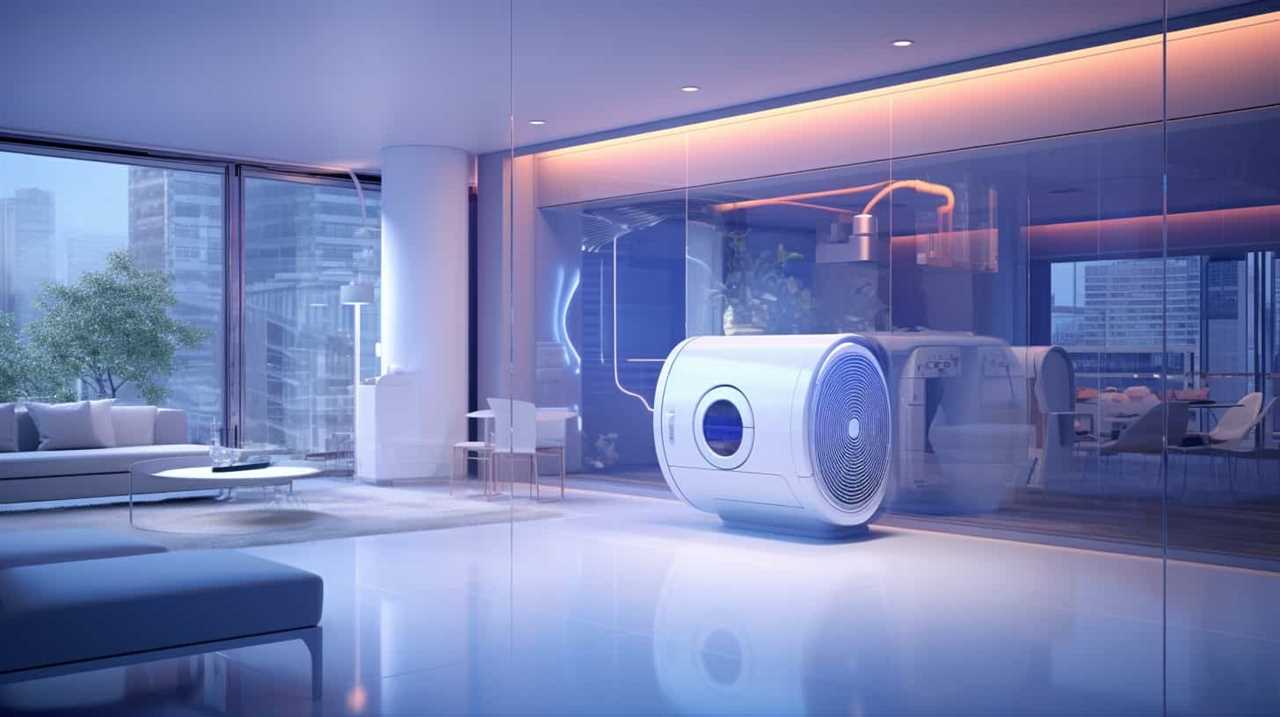
Inadequate Cooling or Heating
When it comes to inadequate cooling or heating in an AC heat pump system, there are two common culprits that we need to address: thermostat calibration issues and insufficient refrigerant levels.
A poorly calibrated thermostat can lead to temperature inconsistencies and an inability to reach the desired cooling or heating levels.
On the other hand, low refrigerant levels can hinder the heat transfer process, resulting in inadequate cooling or heating performance.
It’s essential to address these issues promptly to ensure optimal comfort and efficiency in your AC heat pump system.

Thermostat Calibration Issues
Our AC heat pump may not cool or heat adequately due to issues with thermostat calibration. When the thermostat isn’t properly calibrated, it can lead to inaccurate temperature readings and improper control of the heat pump. This can result in the system not reaching the desired temperature or overshooting it.
Common thermostat malfunction causes include:
- Incorrect placement: If the thermostat is installed in an area with direct sunlight or near a heat source, it may not accurately measure the temperature of the room.
- Dust and debris buildup: Over time, dust and debris can accumulate on the thermostat’s sensors, affecting its accuracy.
- Aging or faulty components: The internal components of the thermostat can wear out or become defective, leading to calibration issues.
To address thermostat calibration issues, it’s recommended to consult a professional technician who can recalibrate the thermostat or replace it if necessary. Regular maintenance and cleaning of the thermostat can also help prevent calibration problems.
Insufficient Refrigerant Levels
One possible cause of inadequate cooling or heating in our AC heat pump is insufficient refrigerant levels. Refrigerant is responsible for absorbing heat from the indoor air and releasing it outside, allowing the system to cool or heat the space effectively. When there’s a refrigerant leak, the levels can become insufficient, resulting in a decrease in cooling or heating performance. Troubleshooting techniques can help identify and address this issue. It’s important to check for any signs of refrigerant leaks, such as oil stains or hissing sounds, and to measure the refrigerant pressure using specialized equipment. Once the leak is located, it can be repaired, and the refrigerant levels can be restored to their optimal state. By addressing inadequate refrigerant levels, we can ensure that our AC heat pump provides the desired cooling or heating efficiency.

Next, let’s explore another issue that can affect the performance of our AC heat pump: frequent cycling on and off.
Frequent Cycling On and Off
We have identified three main points that could be causing the frequent cycling on and off of your AC heat pump.
-
The first point is that the thermostat may need calibration, as an inaccurate reading could lead to improper cycling.
-
Another possible cause is restricted airflow, which could be due to a dirty air filter or blocked vents.

-
Finally, low refrigerant levels can also cause the system to cycle frequently.
Thermostat Calibration Needed
To address thermostat calibration issues resulting in frequent cycling on and off, we need to ensure proper adjustment of the temperature settings. Incorrect calibration can lead to temperature inconsistency and inefficient operation of the AC heat pump system. Here are three key steps to calibrate the thermostat effectively:
- Confirm the accuracy of the thermostat readings by comparing them with a separate thermometer.
- If the thermostat isn’t functioning correctly, consider replacing it with a new one that’s compatible with your AC heat pump system.
- Adjust the anticipator setting, if applicable, to prevent short cycling and ensure proper temperature control.
By following these steps, you can resolve thermostat calibration problems and achieve more efficient and consistent cooling or heating performance.
However, if the cycling issue persists, it may indicate a different problem, such as restricted airflow. Let’s now explore how restricted airflow can cause cycling.
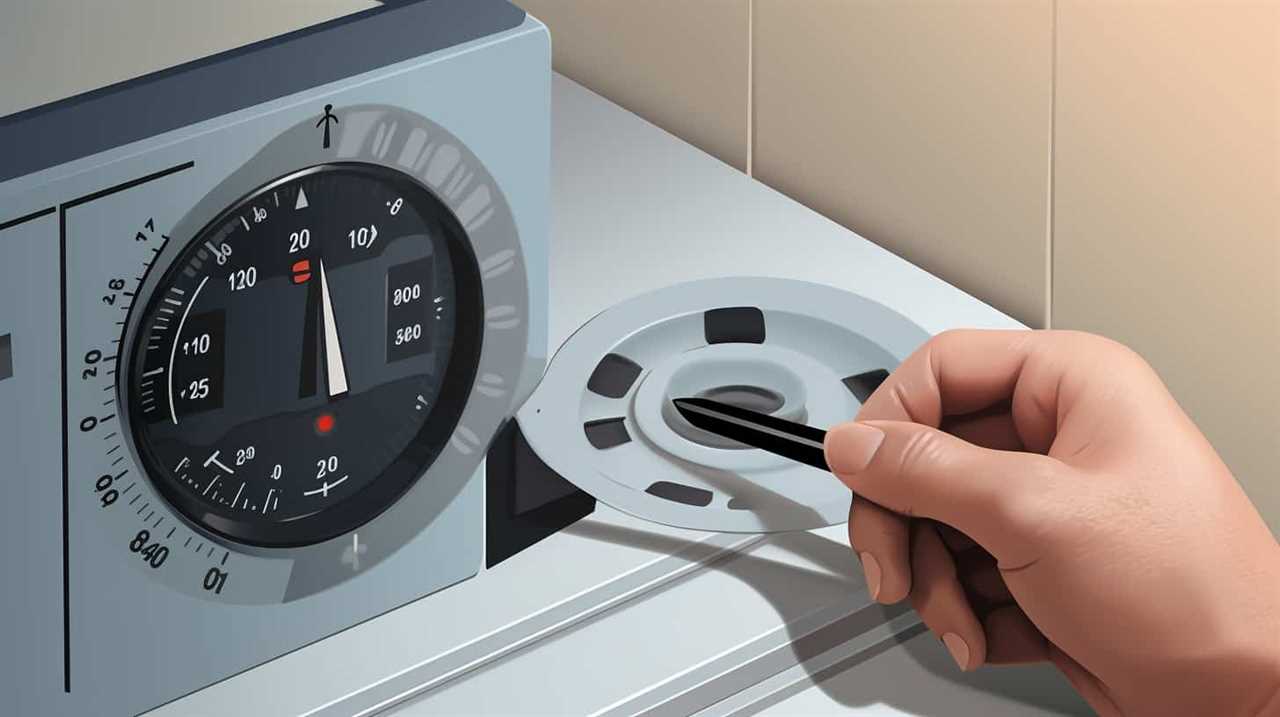
Restricted Airflow Causing Cycling
When restricted airflow occurs, it causes the AC heat pump to cycle on and off frequently, which can lead to inefficient operation and potential damage to the system.
This issue is often caused by improper installation or dirty air filters. Improper installation can restrict the airflow by blocking or obstructing the vents or ducts, preventing the proper circulation of air. This can cause the heat pump to overheat and trigger the cycling on and off.
On the other hand, dirty air filters can clog up with dust, dirt, and debris, significantly reducing the airflow. As a result, the heat pump may struggle to regulate the temperature effectively, leading to frequent cycling.
Regularly inspecting and cleaning the air filters, as well as ensuring proper installation, can help prevent this issue and maintain the efficiency of the AC heat pump system.
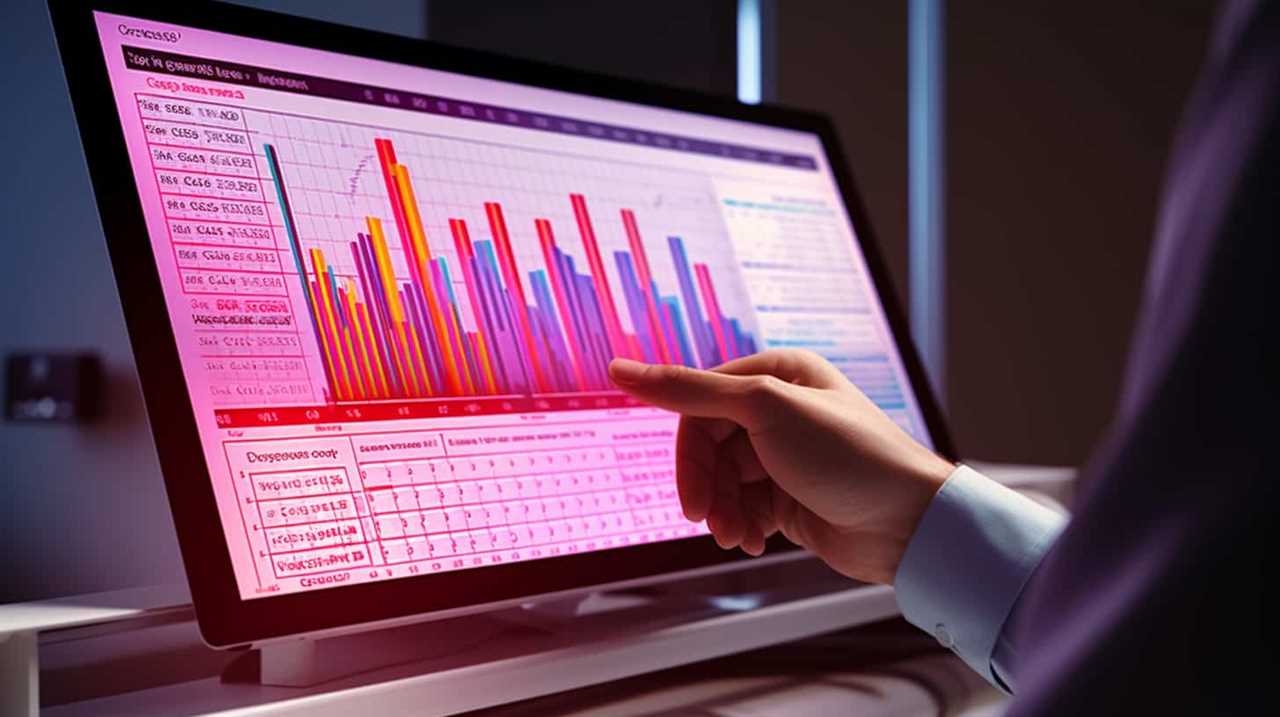
Low Refrigerant Levels
Low refrigerant levels cause the AC heat pump to frequently cycle on and off, resulting in inefficient operation and potential damage to the system. When refrigerant levels are low, the heat pump struggles to transfer heat effectively, leading to increased energy consumption and reduced cooling or heating capacity. To understand if low refrigerant levels are the issue, there are some troubleshooting techniques you can employ:
- Check for refrigerant leaks using a leak detector or soap bubbles.
- Measure the refrigerant pressure using a pressure gauge.
- Inspect the evaporator coil for ice or frost buildup, which could indicate low refrigerant levels.
By identifying and addressing refrigerant leaks promptly, you can prevent further damage to your AC heat pump and improve its overall efficiency.
Now, let’s move on to discussing another common issue with AC heat pumps: noisy operation.
Noisy Operation
One common issue we may encounter with AC heat pumps is that they can produce excessive noise during operation. Noisy operation can be disruptive and bothersome, and it is important to address this issue promptly. To help you troubleshoot and resolve the problem, we have provided a table below outlining potential causes and solutions for noisy operation in AC heat pumps.
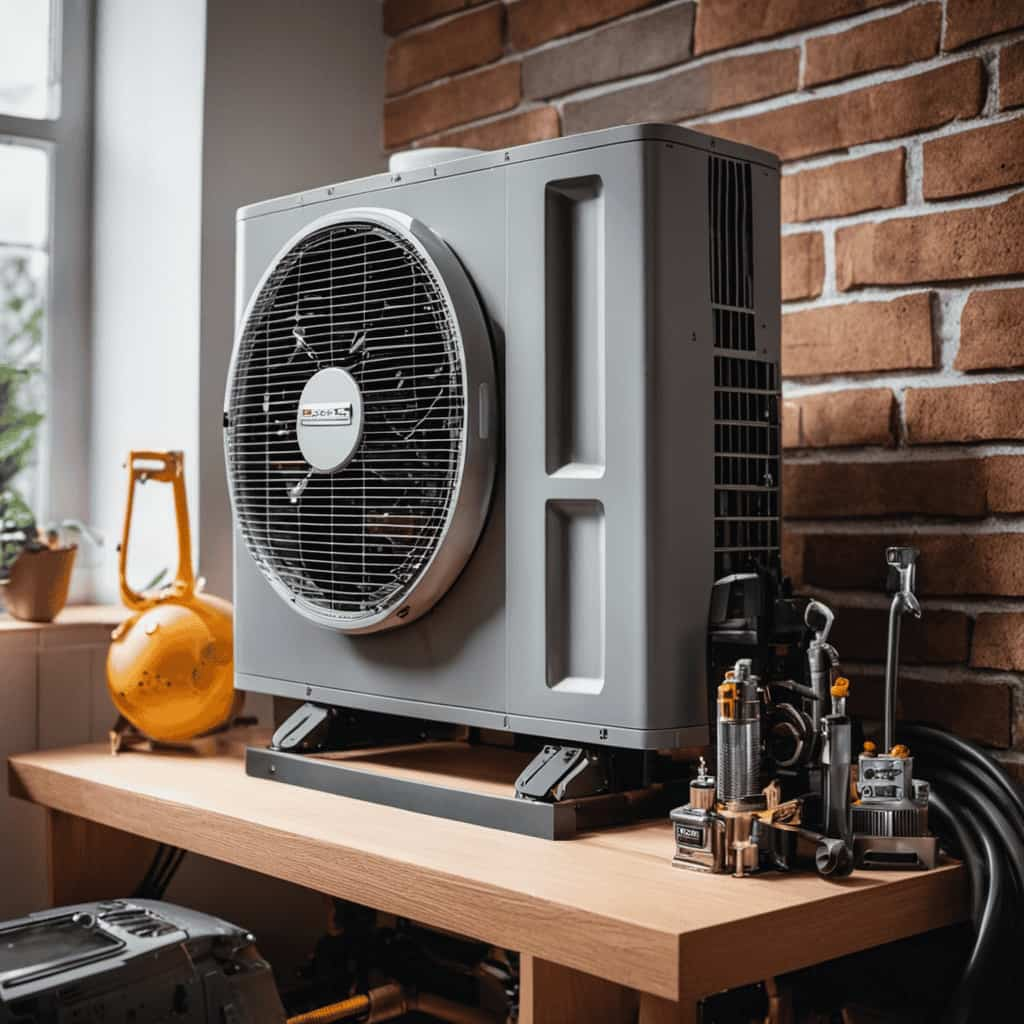
| Issue | Possible Cause | Solution |
|---|---|---|
| Rattling or vibrating noise | Loose components or debris | Tighten or secure loose parts, clear debris |
| Grinding or squealing noise | Worn-out or damaged bearings or belts | Replace bearings or belts |
| Clanking or banging noise | Loose or broken fan blades | Replace or reattach fan blades |
| Hissing or gurgling noise | Refrigerant leak or low refrigerant levels | Repair the leak and recharge refrigerant |
Poor Airflow
Our maintenance team has noticed that a common issue with AC heat pumps is poor airflow. This can be caused by several factors, including improper installation and dirty air filters. Here are three things to consider when troubleshooting poor airflow:
-
Improper installation: If the AC heat pump isn’t installed correctly, it can restrict the airflow. This could be due to a blocked or undersized duct system, or a problem with the unit’s fan or blower motor.
-
Dirty air filters: When air filters become clogged with dust and debris, they can impede the airflow. This not only reduces the efficiency of the heat pump but also puts extra strain on the system, potentially leading to other issues.
-
Blocked vents or registers: Obstructed vents or registers can restrict the airflow, preventing cool or warm air from properly circulating throughout the space.
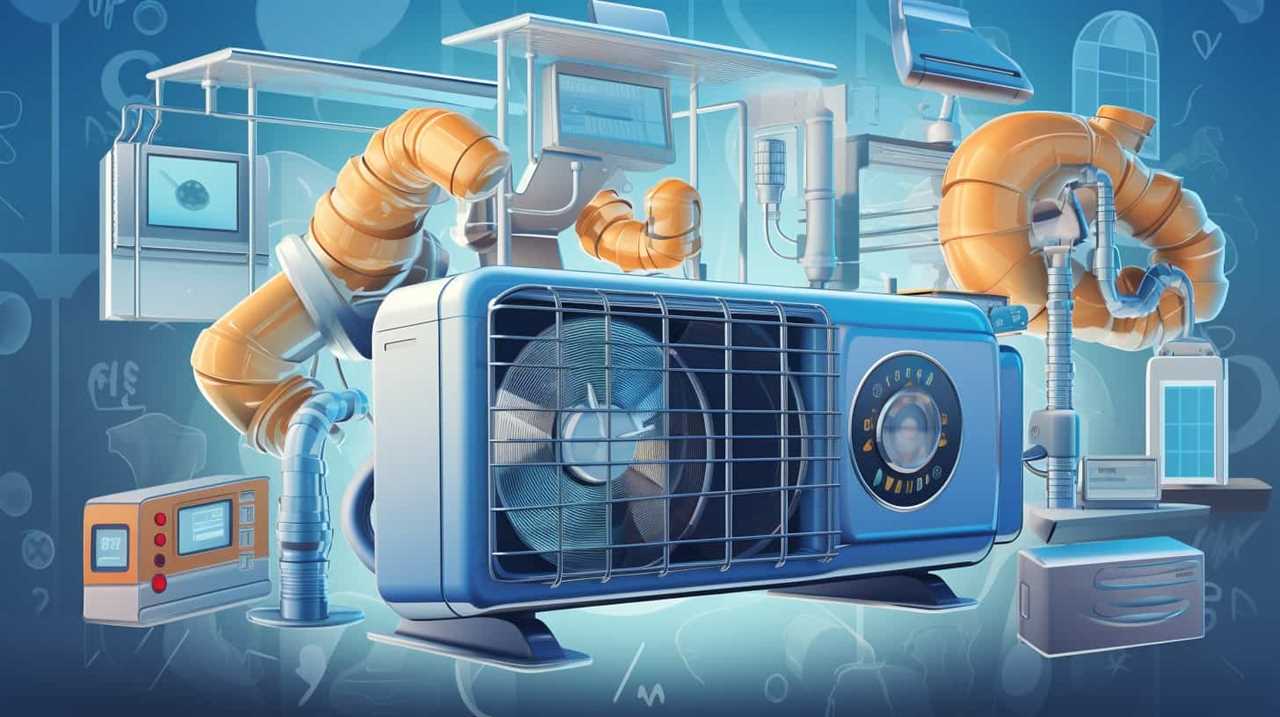
Addressing these issues promptly won’t only improve the airflow of your AC heat pump but also enhance its overall performance and efficiency.
Now, let’s move on to the next section, where we’ll discuss the problem of a frozen evaporator coil.
Frozen Evaporator Coil
When it comes to AC heat pump issues, a frozen evaporator coil is a common problem that can significantly impact performance. Understanding the causes of freezing, implementing proper prevention and maintenance techniques, and troubleshooting and finding solutions are key in addressing this issue.
Causes of Freezing
To understand the causes of freezing in an AC heat pump’s evaporator coil, we need to examine potential issues with airflow and refrigerant levels. Troubleshooting freezing is essential to prevent further damage and ensure efficient operation of the system.
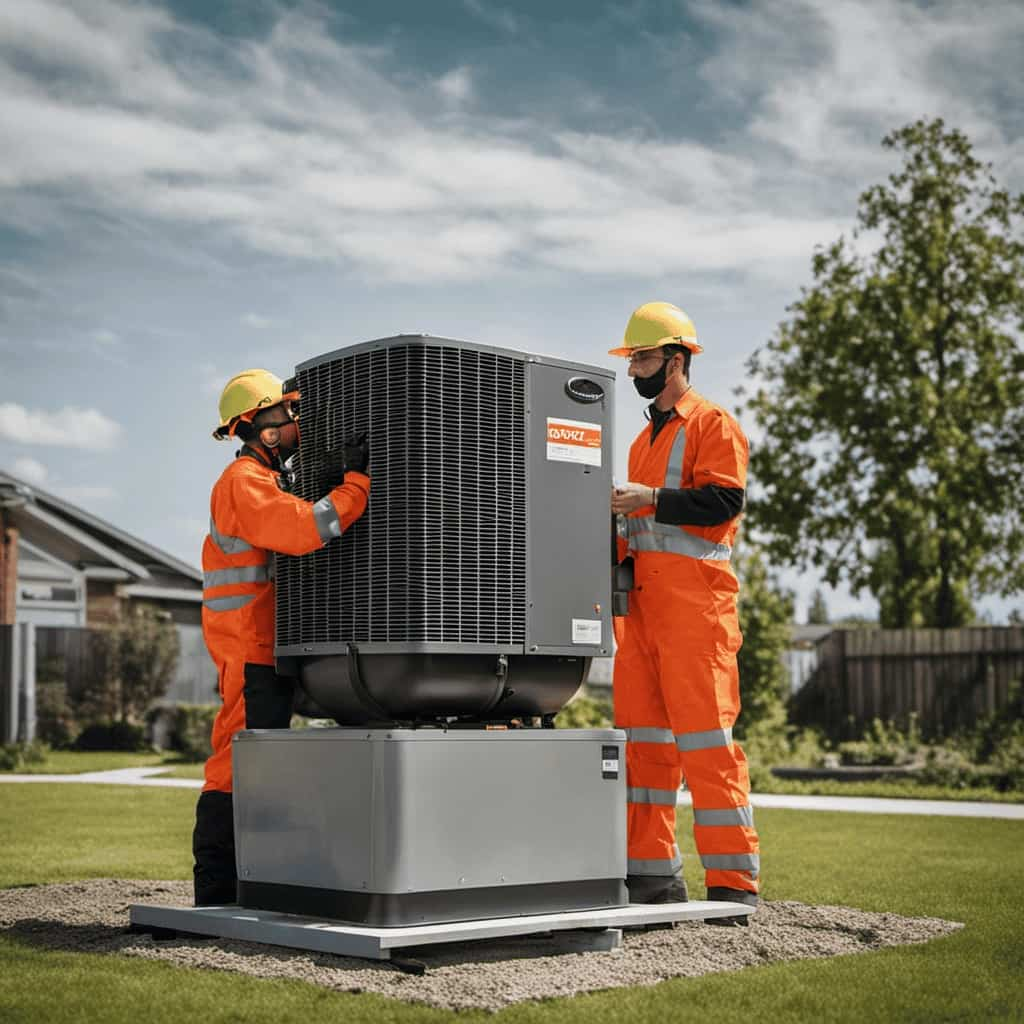
Some common causes of freezing include:
- Restricted airflow: A clogged air filter, closed or blocked vents, or a malfunctioning blower fan can restrict the airflow over the evaporator coil, causing it to freeze.
- Low refrigerant levels: Insufficient refrigerant levels can lead to a drop in pressure and temperature within the evaporator coil, resulting in freezing.
- Dirty evaporator coil: Accumulated dirt and debris on the evaporator coil can insulate it, preventing proper heat transfer and leading to freezing.
Prevention and Maintenance
Regular maintenance and proper prevention techniques are crucial in avoiding a frozen evaporator coil in our AC heat pump system. To prevent this issue, it’s important to follow a maintenance checklist.
-
First, ensure that the air filters are clean and free from debris. Clogged filters can restrict airflow and cause the coil to freeze.
-
Regularly inspect and clean the evaporator coil to remove any dirt or buildup.

-
Additionally, check the refrigerant levels and ensure they’re at the recommended levels. Low refrigerant levels can lead to freezing.
-
It’s also important to maintain proper airflow by keeping the vents clear and unobstructed.
-
Lastly, consider scheduling routine professional maintenance to identify and address any potential issues before they cause the coil to freeze.
Troubleshooting and Solutions
Let’s address the issue of a frozen evaporator coil and uncover troubleshooting techniques and solutions.

When faced with a frozen evaporator coil, there are a few troubleshooting tips and common solutions that can help resolve the issue.
-
Check the air filter: A dirty or clogged air filter can restrict airflow and cause the coil to freeze. Ensure the filter is clean and replace if necessary.
-
Inspect the refrigerant levels: Low refrigerant levels can lead to a frozen coil. A professional technician can assess and recharge the refrigerant if needed.
-
Examine the blower fan: A malfunctioning blower fan can disrupt proper airflow, causing the coil to freeze. Verify that the fan is running smoothly and repair or replace if necessary.
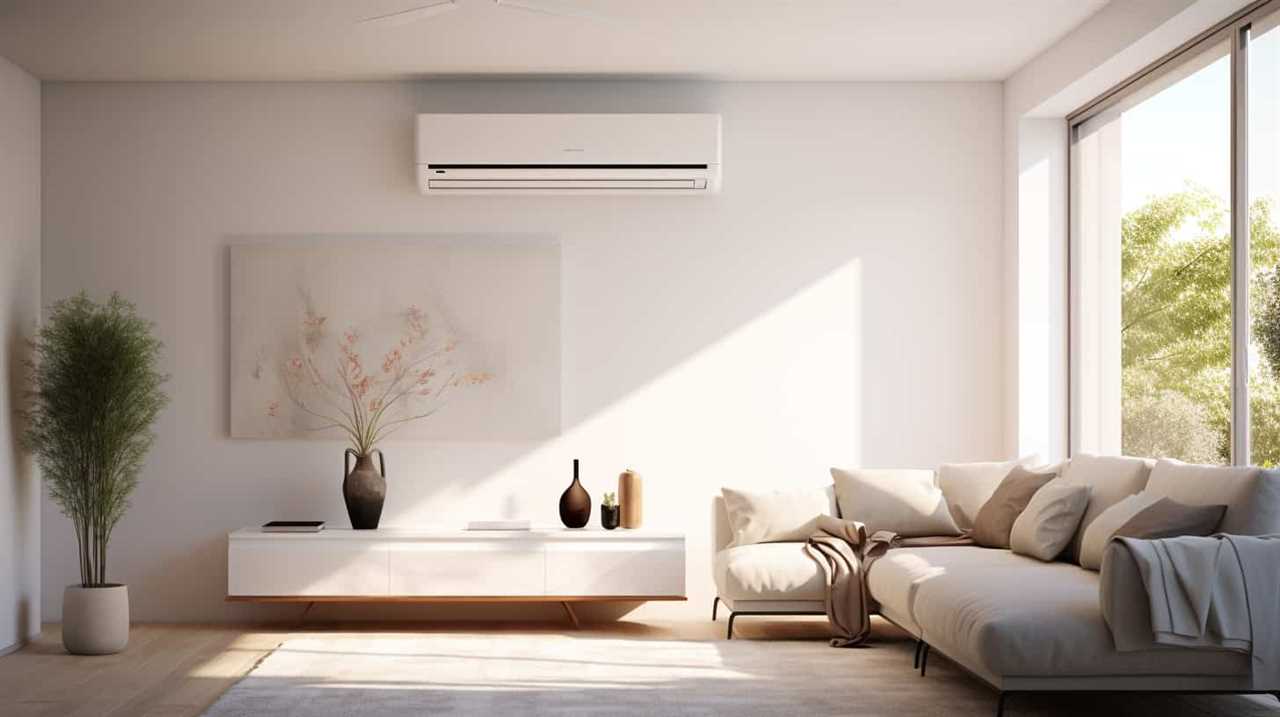
By following these troubleshooting tips and implementing the common solutions, you can resolve the issue of a frozen evaporator coil.
Now, let’s move on to the next section, where we’ll discuss the problem of leaking refrigerant.
Leaking Refrigerant
We’ve identified a recurring problem with AC heat pumps: refrigerant leaks. Leaking refrigerant can cause a decline in cooling or heating efficiency, resulting in discomfort and increased energy costs. To prevent leaks, regular maintenance is crucial. This includes inspecting and cleaning the coils, checking for loose fittings, and ensuring proper refrigerant levels. Additionally, using a high-quality refrigerant can help minimize the risk of leaks. Detecting leaks early is vital to prevent further damage to the system. Signs of a refrigerant leak include reduced cooling or heating performance, hissing sounds, and ice buildup on the outdoor unit. If you suspect a leak, it’s best to call a professional HVAC technician who can perform a thorough inspection and repair the issue promptly.
| Preventing Leaks | Detecting Leaks |
|---|---|
| Regular maintenance | Reduced cooling/heating performance |
| Clean coils | Hissing sounds |
| Check for loose fittings | Ice buildup on the outdoor unit |
| Maintain proper refrigerant levels | |
| Use high-quality refrigerant |
Electrical Issues
To address electrical issues, we can start by checking the power supply and inspecting the wiring connections. Electrical wiring problems and circuit breaker issues can cause various issues with AC heat pumps.

Here are some common electrical issues that may arise:
-
Loose wiring connections: Over time, the vibrations from the unit can cause the electrical connections to become loose. This can result in intermittent power supply or even complete failure of the heat pump.
-
Faulty circuit breakers: If the circuit breaker is malfunctioning, it may trip frequently or fail to provide sufficient power to the heat pump. This can lead to inconsistent heating or cooling or the unit not working at all.
-
Overloaded electrical system: If the AC heat pump is connected to an overloaded electrical system, it can cause the circuit breaker to trip repeatedly. This can be resolved by redistributing the electrical load or upgrading the electrical system.
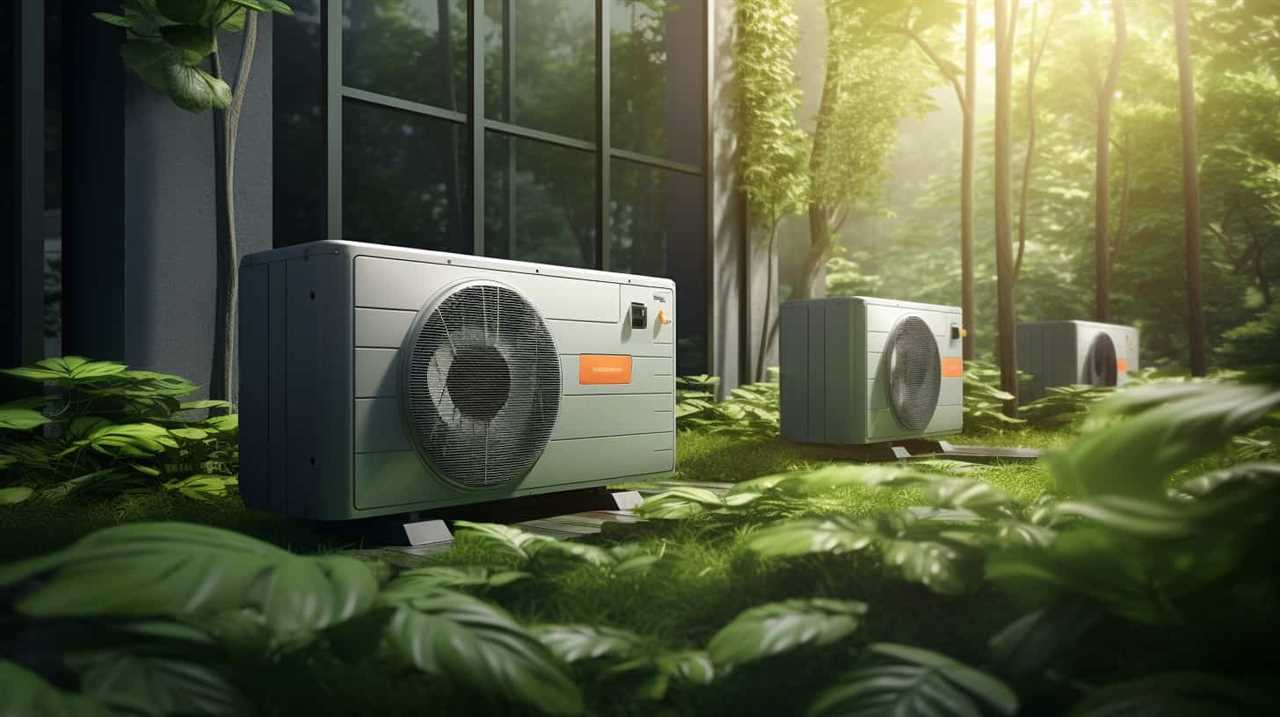
It is crucial to address these electrical issues promptly to ensure the smooth operation of the AC heat pump and prevent any further damage.
Thermostat Malfunction
For thermostat malfunctions, we can check the settings and replace the batteries if necessary. If the heat pump isn’t responding to changes in temperature or isn’t turning on at all, it may be due to a malfunctioning thermostat.
To troubleshoot this issue, start by checking the settings on the thermostat. Make sure it’s set to the desired temperature and mode (cooling or heating). If the settings are correct, check the batteries. A low battery can cause the thermostat to malfunction. Replace the batteries with fresh ones and see if that resolves the issue.
If the problem persists, it may be necessary to replace the thermostat altogether.
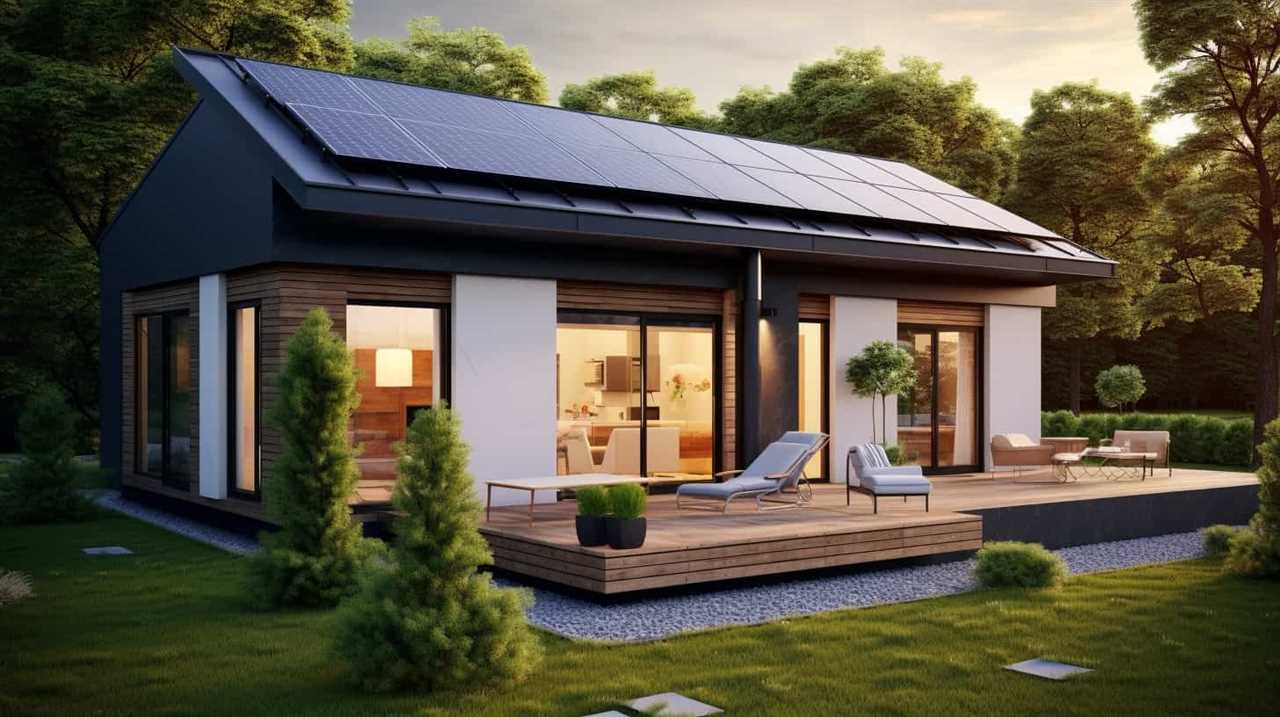
In the next section, we’ll discuss what to do if the heat pump isn’t turning on.
Heat Pump Not Turning On
If the heat pump isn’t turning on, it could be because of a faulty electrical connection.
To troubleshoot this issue, consider the following possibilities:
-
Check the power supply: Ensure that the heat pump is properly connected to a functioning power source. Verify that the circuit breaker isn’t tripped and that the fuse is intact.
-
Inspect the thermostat: A malfunctioning thermostat can prevent the heat pump from turning on. Consider replacing the thermostat if it’s unresponsive or displaying incorrect temperature readings.
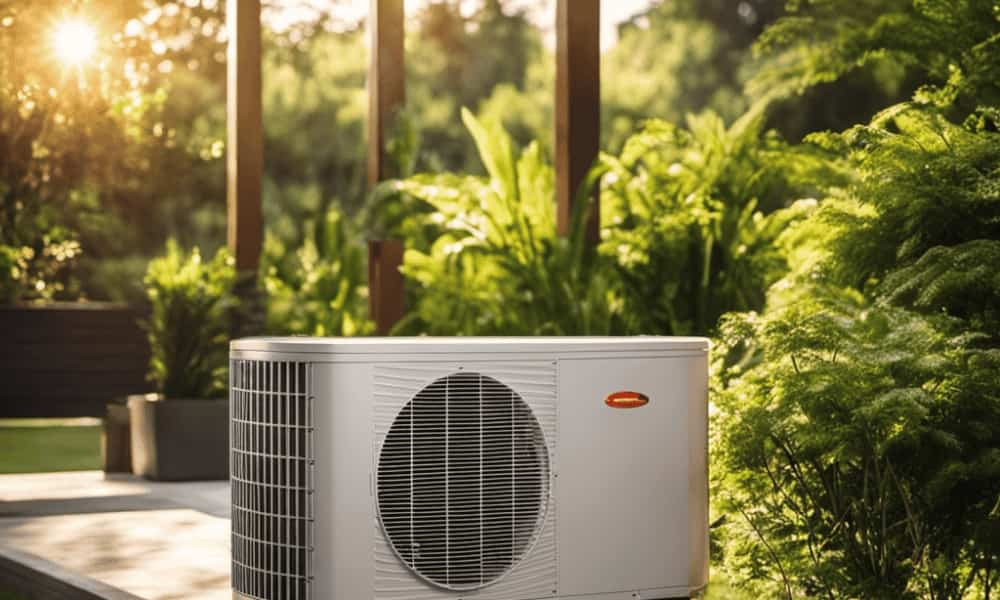
-
Examine the wiring: Faulty wiring can disrupt the electrical connection and prevent the heat pump from operating. Look for loose or damaged wires and repair or replace them as necessary.
By addressing these potential causes, you can increase the chances of resolving the heat pump’s failure to turn on.
If these troubleshooting steps don’t solve the issue, it’s recommended to seek professional assistance.
Frequently Asked Questions
How Often Should I Have My AC Heat Pump Serviced to Avoid Common Problems?
We recommend regular AC heat pump maintenance to prevent common problems. Signs of AC heat pump issues include reduced cooling or heating efficiency, strange noises, and frequent breakdowns.
Are There Any Specific Maintenance Tasks I Can Perform to Improve the Cooling or Heating Capabilities of My AC Heat Pump?
To improve the cooling or heating capabilities of our AC heat pump, we can perform specific maintenance tasks. These tasks focus on optimizing efficiency and improving performance, ensuring that our system operates at its best.

What Can I Do to Reduce the Noise Produced by My AC Heat Pump During Operation?
To reduce the noise produced by our AC heat pump during operation, we can implement effective solutions and follow tips to minimize AC heat pump noise.
Is It Normal for the Airflow From My AC Heat Pump to Vary in Different Rooms of My House?
Yes, it is common for the airflow distribution from an AC heat pump to vary in different rooms, leading to temperature inconsistency. This issue can be resolved by adjusting the ductwork or installing zoning systems.
Can a Thermostat Malfunction Cause My AC Heat Pump to Not Turn on at All?
Yes, a thermostat malfunction can cause our AC heat pump to not turn on at all. If we are experiencing this issue, we should start by troubleshooting the thermostat to identify and resolve the problem.
Conclusion
In conclusion, understanding and addressing AC heat pump issues is crucial for maintaining a comfortable and efficient home environment.
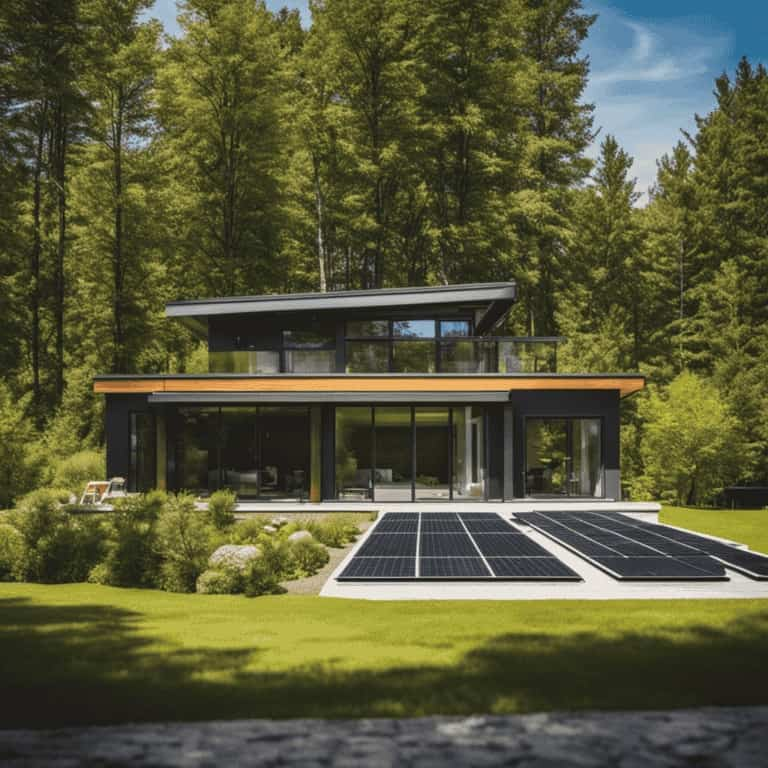
By recognizing common problems such as inadequate cooling or heating, frequent cycling, noisy operation, poor airflow, leaking refrigerant, electrical issues, thermostat malfunction, and heat pump not turning on, homeowners can take appropriate measures to resolve these issues.
With proper maintenance and timely repairs, a well-functioning AC heat pump can provide optimal cooling and heating, ensuring a pleasant and comfortable living space.
Air Conditioning
Chill Out: Unraveling Air Conditioning Heat Pump Prices

Everyone wants to stay cool during the scorching summer months, but did you know that the prices of air conditioning units can vary significantly? In fact, the costs of installation, maintenance, and repairs can add up quickly.
That’s why we’re here to help unravel the complexities and provide you with the information you need to make the best decisions for your home.
From understanding the factors that affect prices to finding affordable installation services, we’ve got you covered.
So, let’s dive in and chill out!

Key Takeaways
- Factors affecting air conditioning heat pump prices include the size and capacity of the unit, energy efficiency rating, complexity of installation, brand reputation, and manufacturer warranty.
- The cost of air conditioning heat pump installation depends on the size and complexity of the system, quality of the equipment, labor involved, and long-term benefits such as increased energy efficiency and improved comfort.
- When comparing air conditioning heat pump brands and prices, factors to consider include energy efficiency, reliability, warranty coverage, price comparison, and finding a balance between upfront cost and long-term savings.
- Hidden costs to consider when installing an air conditioning heat pump include hidden installation fees, long-term energy savings, obtaining a detailed quote from the installer, weighing hidden costs against long-term benefits, and making an informed decision.
Factors Affecting Air Conditioning Heat Pump Prices
When considering air conditioning heat pump prices, there are several factors that can affect the overall cost. Understanding these factors is crucial for finding affordable air conditioning heat pump installation services.
The size and capacity of the unit play a significant role in determining the price. Larger units with higher capacities tend to be more expensive.
Additionally, the energy efficiency rating of the heat pump impacts the cost. Units with higher efficiency ratings are typically pricier, but they can lead to long-term savings on energy bills.
The complexity of the installation process is another factor to consider. If the installation requires additional ductwork or modifications to the existing system, it can increase the overall cost.
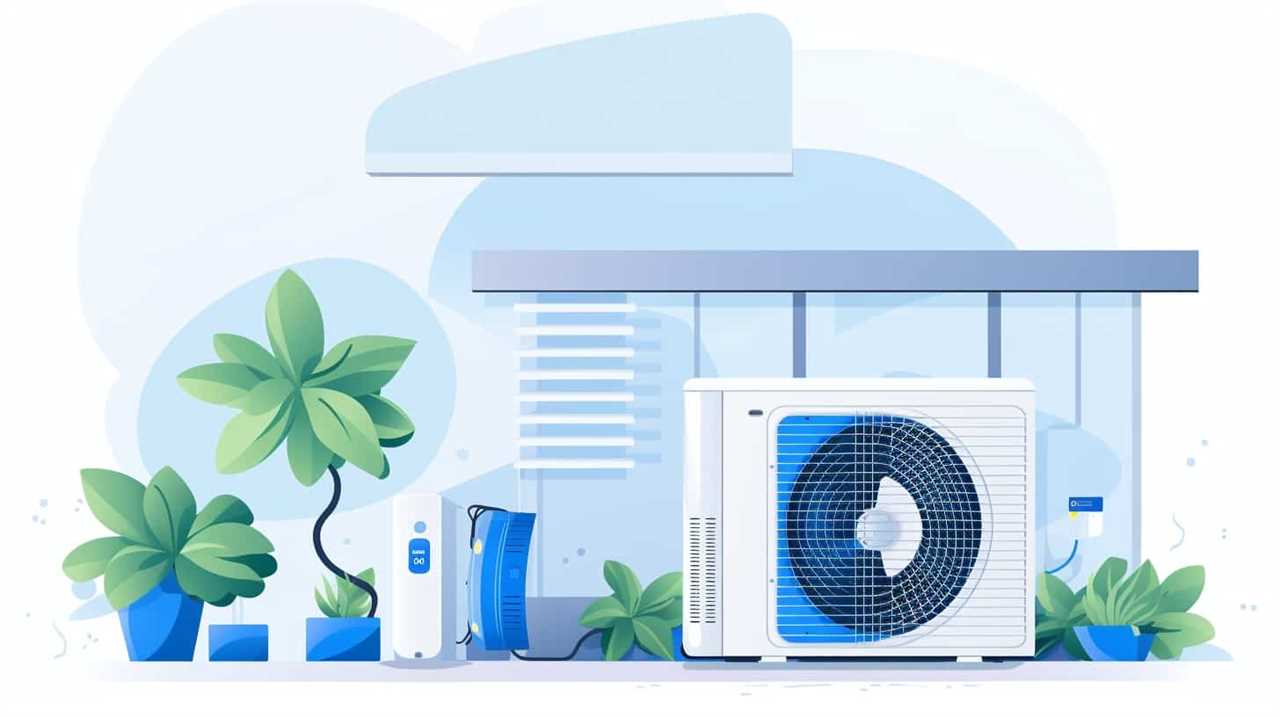
Lastly, the brand reputation and warranty offered by the manufacturer can influence the price.
Considering these factors and seeking out reputable and affordable installation services is essential for making an informed decision.
Understanding the Cost of Air Conditioning Heat Pump Installation
We have identified three key factors that contribute to the cost of air conditioning heat pump installation:
-
The size and complexity of the system: This is determined by the square footage of the area to be cooled and the number of rooms or zones that need to be controlled. A larger system or one with more advanced features will generally cost more.

-
The quality of the equipment: This also affects the price, as higher efficiency units tend to be more expensive upfront but can save on energy costs in the long run.
-
The labor involved: This includes any necessary modifications to the existing infrastructure and will contribute to the overall cost.
It’s important to consider the long-term benefits of air conditioning heat pump installation, such as increased energy efficiency and improved comfort, when evaluating the cost.
Comparing Air Conditioning Heat Pump Brands and Prices
As we compare air conditioning heat pump brands and prices, it’s important to consider factors such as energy efficiency, reliability, and warranty coverage. These factors can greatly impact the long-term cost and satisfaction of owning an air conditioning heat pump.

Here are four key considerations when comparing different brands and their prices:
-
Energy efficiency: Look for models that have a high SEER (Seasonal Energy Efficiency Ratio) rating. Higher SEER ratings indicate better energy efficiency and lower operating costs over time.
-
Reliability: Research customer reviews and ratings to determine the reliability of different brands. A reliable air conditioning heat pump will require fewer repairs and have a longer lifespan.
-
Warranty coverage: Check the warranty options offered by each brand. A comprehensive warranty can provide peace of mind and protect against unexpected repair costs.

-
Price: Compare the prices of different brands, taking into account the energy efficiency and warranty coverage. It’s important to find a balance between upfront cost and long-term savings.
Hidden Costs to Consider When Installing an Air Conditioning Heat Pump
Before making a decision, it’s important for us to be aware of the hidden costs associated with installing an air conditioning heat pump.
While the upfront price of the heat pump itself is a significant consideration, there are other expenses to keep in mind. One of these is the hidden installation fees. These fees can vary depending on factors such as the complexity of the installation, the location of the unit, and any additional work that may be required. It’s crucial to obtain a detailed quote from the installer to understand the full cost of the installation.
Another factor to consider is the long-term energy savings that can be achieved with an air conditioning heat pump. While the initial investment may be higher, the efficiency of the heat pump can lead to substantial savings on energy bills over time.

It’s essential to weigh these hidden costs against the potential long-term benefits before making a decision.
How to Budget for Air Conditioning Heat Pump Installation
When it comes to budgeting for air conditioning heat pump installation, there are a few cost-saving installation tips that can help keep expenses down.
One option is to consider financing options available, such as low-interest loans or payment plans, which can make the upfront costs more manageable.
Cost-Saving Installation Tips
We should consider three cost-saving installation tips to help us budget for air conditioning heat pump installation.

-
Choose cost-effective options: When selecting an air conditioning heat pump, consider the initial cost, as well as long-term savings. Look for models that offer energy efficiency and lower maintenance costs. Additionally, consider purchasing from reputable manufacturers that offer warranties and after-sales support.
-
Optimize installation location: Proper placement of the heat pump can significantly impact its efficiency and overall performance. Ensure that the unit is installed in a shaded area to reduce the load on the system and prevent unnecessary strain. Additionally, avoid areas with high humidity or excessive dust accumulation, as this can affect the heat pump’s longevity.
-
Seek professional installation services: Hiring a professional for installation ensures that the process is done correctly, minimizing the risk of errors or damage. They can also provide expert advice on optimizing the system’s performance and efficiency.
Financing Options Available
Let’s explore the financing options available to help us budget for air conditioning heat pump installation.
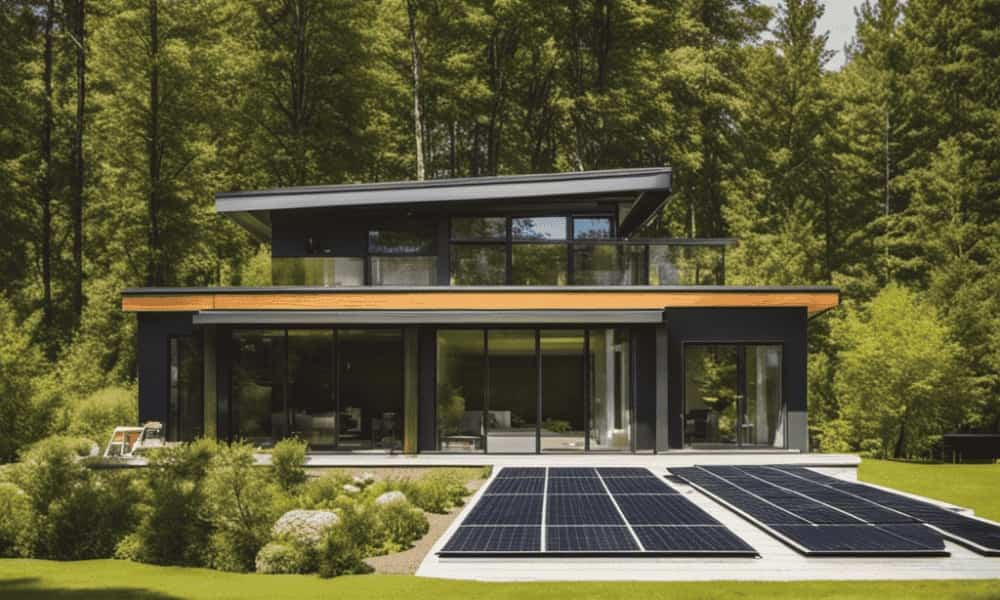
When it comes to paying for the installation of an air conditioning heat pump, there are several payment options to consider. Many HVAC companies offer financing programs that allow customers to spread the cost of the installation over a period of time. These programs often come with competitive interest rates, making it more affordable for homeowners to invest in a new system. Some financing options may even offer promotional periods with low or zero interest rates, providing additional savings.
By utilizing these payment options, homeowners can better manage their budgets and avoid the upfront costs of installation.
Now that we understand the financing options available, let’s move on to the next section where we’ll discuss tips for finding affordable air conditioning heat pump installation services.
Tips for Finding Affordable Air Conditioning Heat Pump Installation Services
Finding affordable air conditioning heat pump installation services can be a challenge. When searching for the best installation services at a reasonable price, consider the following tips:

-
Compare quotes from multiple service providers: Request quotes from different installation companies to compare prices and services offered. This will help you find the most affordable option that meets your requirements.
-
Seek recommendations: Ask friends, family, or neighbors who’ve recently installed air conditioning heat pumps for recommendations on affordable and reliable installation services.
-
Look for special offers or discounts: Keep an eye out for special promotions or discounts offered by installation companies. These can provide an opportunity to save money on the installation cost.
-
Consider DIY installation: If you have the necessary skills and knowledge, opting for a DIY installation can save you a significant amount of money. However, ensure that you’re confident in your abilities before attempting this option.

Financing Options for Air Conditioning Heat Pump Installation
When it comes to financing options for air conditioning heat pump installation, there are two main choices to consider: obtaining a loan or leasing the equipment. Both options have their pros and cons, and it’s important to carefully evaluate them based on your specific circumstances.
Additionally, credit requirements may vary depending on the financing option you choose, so it’s crucial to check your credit score and history beforehand.
Lastly, it’s worth exploring the payment plans offered by different lenders or leasing companies to find one that aligns with your budget and preferences.
Loan Vs. Lease
We’ve compared the pros and cons of loan and lease options to finance the installation of an air conditioning heat pump. Here’s a breakdown of each option:
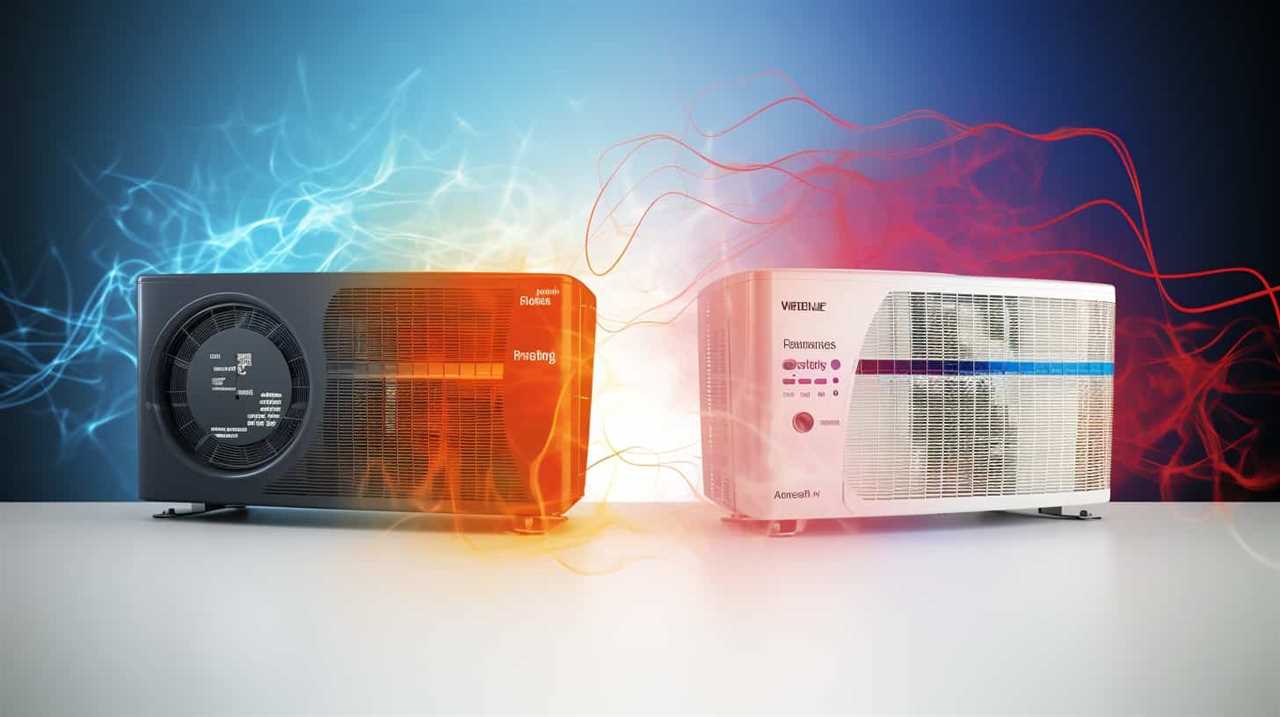
-
Loan options: Taking out a loan allows you to own the heat pump outright. With a loan, you make monthly payments towards the principal and interest. This option gives you the flexibility to choose the loan term and interest rate that best fits your budget.
-
Lease agreements: Leasing a heat pump means you don’t own it, but you have the right to use it for a specified period. Lease agreements typically come with lower upfront costs and maintenance responsibilities. However, you won’t build equity in the equipment and may have restrictions on customization.
-
Flexibility: Loans offer more flexibility in terms of equipment choices and customization options. With a lease, you may have limited options for equipment selection and modifications.
-
Long-term costs: While loans may have higher upfront costs, in the long run, you’ll own the equipment and benefit from reduced energy bills. Leases may have lower upfront costs, but you’ll have ongoing monthly payments and may not experience the same energy savings.

Considering the pros and cons of loan and lease options, it’s important to evaluate your financial situation and long-term goals before making a decision.
Now, let’s dive into the credit requirements for financing an air conditioning heat pump installation.
Credit Requirements
To finance the installation of an air conditioning heat pump, our credit requirements and available financing options must be considered. When it comes to credit requirements, lenders typically evaluate factors such as credit score, income, and debt-to-income ratio. A good credit score and stable income will increase your chances of securing favorable financing options for your air conditioning heat pump installation. Speaking of financing options, let’s take a look at the table below to understand the different options available:
| Financing Option | Description | Pros |
|---|---|---|
| Personal Loan | A loan obtained from a bank or credit union for the specific purpose of financing your air conditioning heat pump installation. | Flexible repayment terms, lower interest rates compared to credit cards. |
| Manufacturer Financing | Financing options offered by the manufacturer of the air conditioning heat pump. | Special promotions or discounts, may have more lenient credit requirements. |
| Home Equity Loan | A loan that allows you to borrow against the equity in your home. | Potentially tax-deductible interest, longer repayment terms. |
Payment Plans Offered
By exploring the available financing options, we can find payment plans that suit our budget for air conditioning heat pump installation. Here are four financing options to consider:

-
Traditional Bank Loan: This option allows us to borrow a specific amount of money from a bank to finance our air conditioning heat pump installation. We’ll need to repay the loan over a fixed period of time with interest.
-
Manufacturer Financing: Some air conditioning heat pump manufacturers offer financing options directly to customers. These financing plans may come with competitive interest rates and flexible repayment terms.
-
Lease-to-Own: With a lease-to-own option, we can lease the air conditioning heat pump and have the option to purchase it at the end of the lease term. This option may be beneficial for those who prefer lower monthly payments initially.
-
Home Equity Line of Credit (HELOC): If we’ve equity in our home, we can use a HELOC to finance our air conditioning heat pump installation. This option allows us to borrow against the equity in our home and typically offers lower interest rates than other financing options.

Saving Money on Air Conditioning Heat Pump Maintenance and Repairs
Our best strategy for saving money on air conditioning heat pump maintenance and repairs is to perform regular inspections and cleanings. By conducting routine inspections, we can identify any potential issues early on and address them before they become major problems. This can help prevent costly repairs down the line.
Additionally, regular cleanings of the air conditioning heat pump can improve its efficiency and prolong its lifespan. Cleaning the coils, filters, and condensate drain can ensure that the heat pump operates at its optimal level, reducing energy consumption and saving money on utility bills.
It’s also important to check and tighten any loose electrical connections, as they can lead to performance issues or even system failure. Following these maintenance tips can help homeowners save money and keep their air conditioning heat pumps running smoothly.
Frequently Asked Questions
Are There Any Government Incentives or Tax Credits Available for Purchasing and Installing an Air Conditioning Heat Pump?
Yes, there are government incentives and tax credits available for purchasing and installing an air conditioning heat pump. These include government tax incentives and energy efficiency rebates that can help offset the cost of the system.
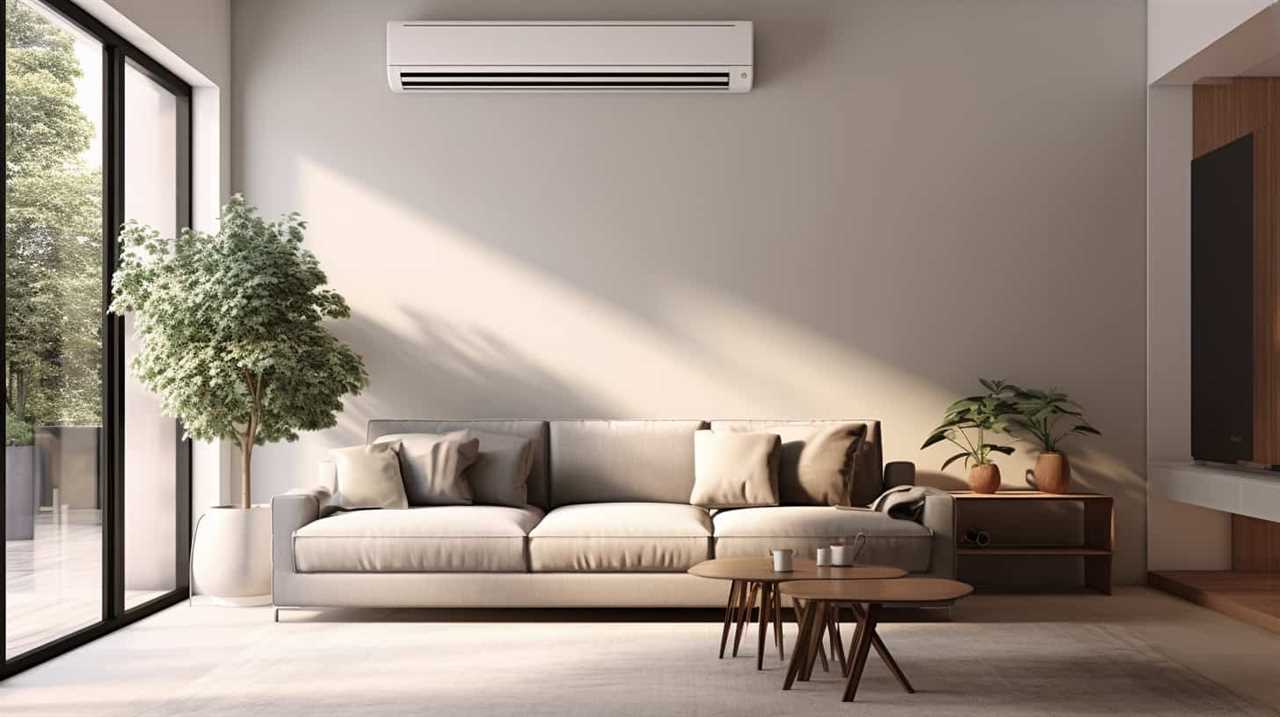
What Is the Average Lifespan of an Air Conditioning Heat Pump?
The average lifespan of an air conditioning heat pump can vary, but it is typically around 15-20 years. Regular maintenance, such as cleaning the filters and coils, can help prolong its lifespan.
Can I Install an Air Conditioning Heat Pump Myself, or Is Professional Installation Required?
We can choose to install an air conditioning heat pump ourselves, but professional installation is recommended. DIY installation may save money, but professional installation ensures proper setup and performance, minimizing potential risks and maximizing efficiency.
How Can I Determine the Right Size Air Conditioning Heat Pump for My Home?
To determine the right size air conditioning heat pump for our home, we need to consider factors such as square footage, insulation, and climate. Proper sizing ensures optimal performance and energy efficiency, resulting in lower maintenance costs and greater comfort.
Are There Any Energy-Saving Features or Technologies That I Should Look for When Choosing an Air Conditioning Heat Pump?
When choosing an air conditioning heat pump, it’s important to consider energy-efficient technologies and the benefits of smart thermostats. These features can help reduce energy consumption and lower utility bills.

Conclusion
In conclusion, if you want to unravel the mysterious world of air conditioning heat pump prices, just take a chill pill.
While the cost of installation and maintenance may cause some sweat to form on your brow, there are ways to keep your cool.
By understanding the factors that affect prices, comparing brands, and considering hidden costs, you can budget wisely and find affordable installation services.
So don’t let the heat get to you, stay cool and save some cash!
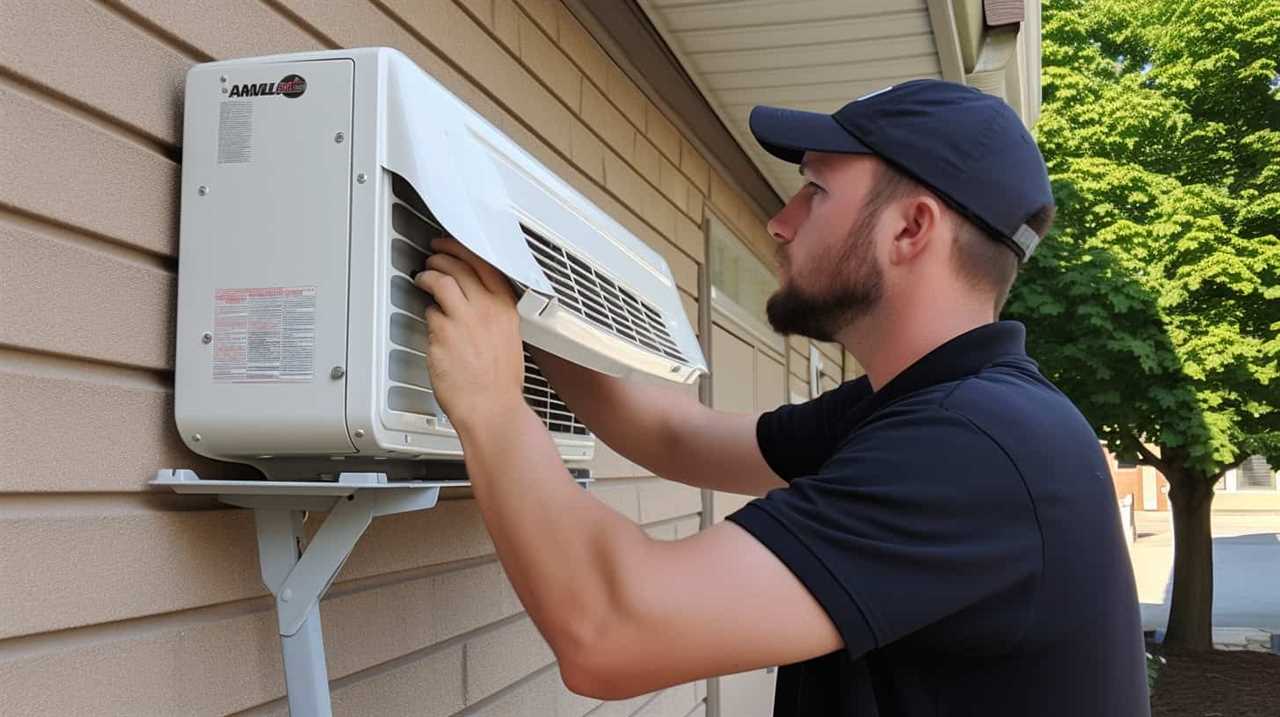
Air Conditioning
What Are the Top Energy-Efficient Heat Pump Acs

We have found the top energy-efficient heat pump air conditioners that are revolutionizing the way we cool our homes.
Did you know that these advanced units can reduce energy consumption by up to 50% compared to traditional air conditioners?
In this article, we’ll explore the top brands in the market and share essential factors to consider when choosing an energy-efficient heat pump AC.
Get ready to embrace innovation and maximize your cooling efficiency with these cutting-edge systems.
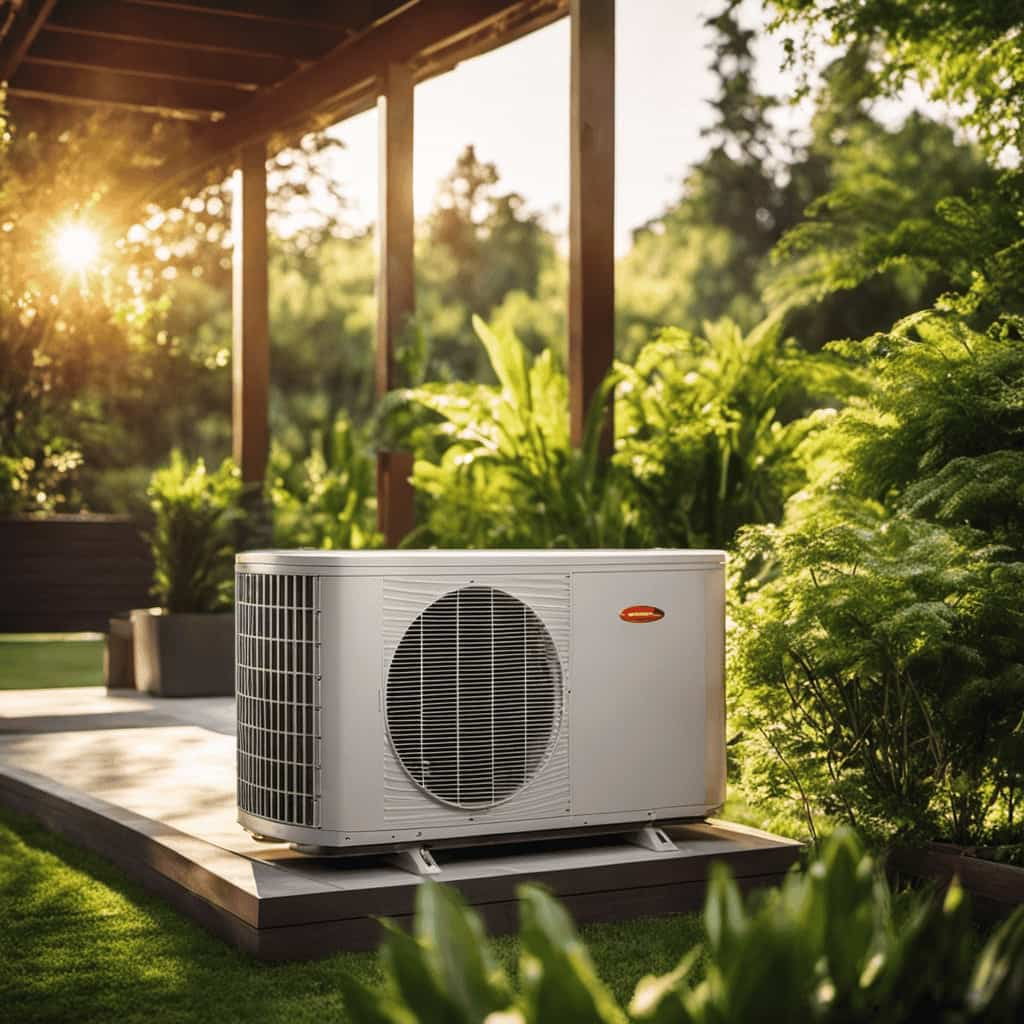
Key Takeaways
- Energy-Efficient Heat Pump ACs can reduce energy consumption by up to 50% compared to traditional air conditioners, leading to significant savings on electricity bills.
- The SEER rating of a heat pump AC is an important factor to consider, as higher SEER ratings indicate greater energy efficiency.
- It is crucial to choose the right size heat pump AC for optimal energy efficiency, avoiding units that are either too small or oversized.
- Trane and Carrier are top brands in the market that offer reliable and sustainable cooling and heating solutions, prioritizing innovation and efficiency.
Benefits of Energy-Efficient Heat Pump ACs
We love energy-efficient heat pump ACs because they save us money on our electricity bills. These advanced systems utilize cutting-edge energy-saving technology, allowing us to reduce our energy consumption without sacrificing comfort.
By using less electricity, we can significantly lower our monthly utility costs, resulting in substantial long-term cost savings. Energy-efficient heat pump ACs are designed to operate at optimal efficiency levels, maximizing the cooling and heating output while minimizing energy waste.
This innovative technology not only benefits our wallets but also helps protect the environment by reducing our carbon footprint.
When considering the purchase of an energy-efficient heat pump AC, it’s crucial to evaluate factors such as energy efficiency ratings, capacity, and compatibility with our home’s existing HVAC system. Making an informed decision ensures that we can fully enjoy the benefits of energy-efficient cooling and heating while maximizing our cost savings.
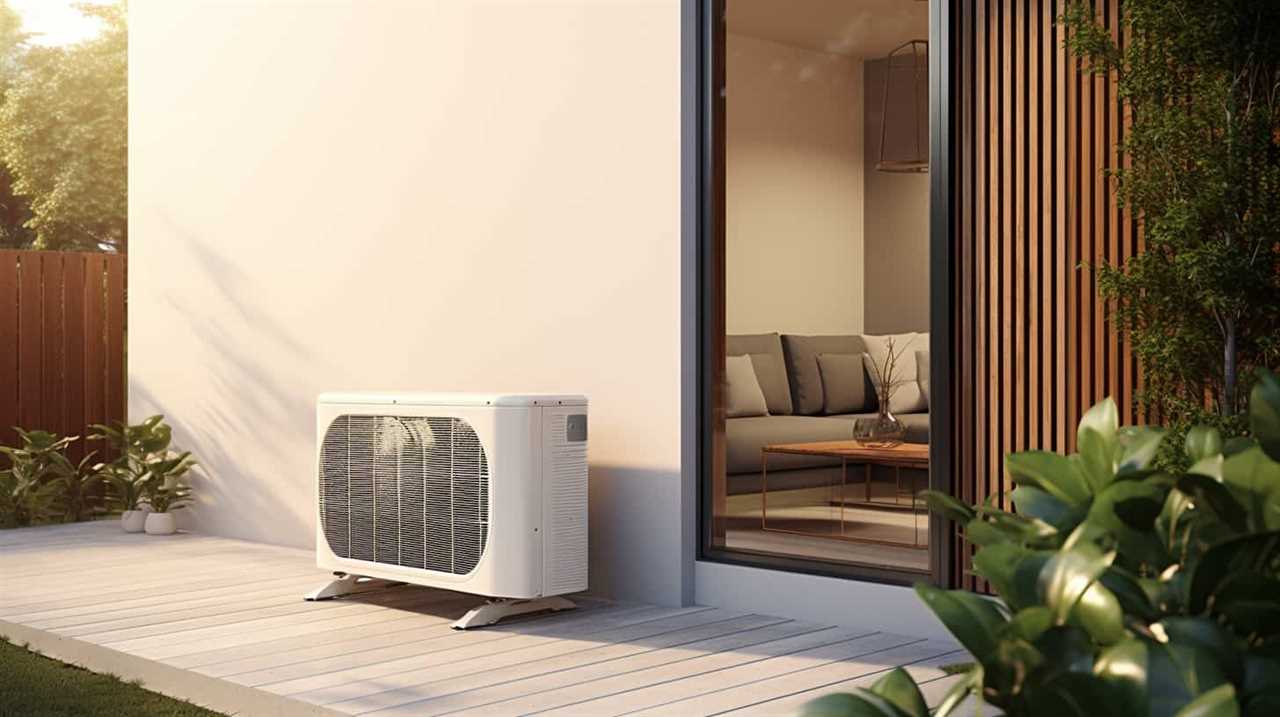
Factors to Consider When Choosing an Energy-Efficient Heat Pump AC
Two key factors to consider when choosing an energy-efficient heat pump AC are the SEER rating and the size of the unit.
-
SEER rating: The Seasonal Energy Efficiency Ratio (SEER) measures the cooling efficiency of an AC unit. Higher SEER ratings indicate greater energy efficiency, resulting in lower energy consumption and cost savings over time. Look for units with SEER ratings of 14 or higher for optimal energy efficiency.
-
Size of the unit: Choosing the right size is crucial for energy efficiency. A unit that’s too small will struggle to cool the space efficiently, while an oversized unit will cycle on and off frequently, wasting energy. It’s important to have a professional assess the cooling needs of your space and recommend the appropriate size.
Considering these factors won’t only ensure cost-effective options for energy-efficient heat pump ACs but also minimize the environmental impact of your cooling system.

Top Energy-Efficient Heat Pump AC Brands in the Market
Among the top energy-efficient heat pump AC brands in the market, Trane and Carrier stand out for their innovative technology and high-performance units. These brands offer a range of top rated heat pump AC models that provide both efficient cooling and heating, making them a cost effective heat pump AC option for consumers. Trane is known for its advanced ComfortLink™ II communicating technology, which allows the system components to automatically communicate and optimize performance. Carrier, on the other hand, offers the Infinity® Series heat pumps that deliver precise temperature control and enhanced energy efficiency. Both brands prioritize innovation and efficiency to provide customers with reliable and sustainable cooling and heating solutions.
| Brand | Technology | Energy Efficiency |
|---|---|---|
| Trane | ComfortLink™ II | High |
| Carrier | Infinity® Series | High |
Table 1: Comparison of Energy-Efficient Heat Pump AC Brands
These top energy-efficient heat pump AC brands offer cutting-edge technology and high energy efficiency ratings, making them a smart choice for consumers seeking innovative cooling and heating solutions.
Features to Look for in an Energy-Efficient Heat Pump AC
Our focus now shifts to the features to look for in an energy-efficient heat pump AC. When searching for the perfect unit, keep these key features in mind:
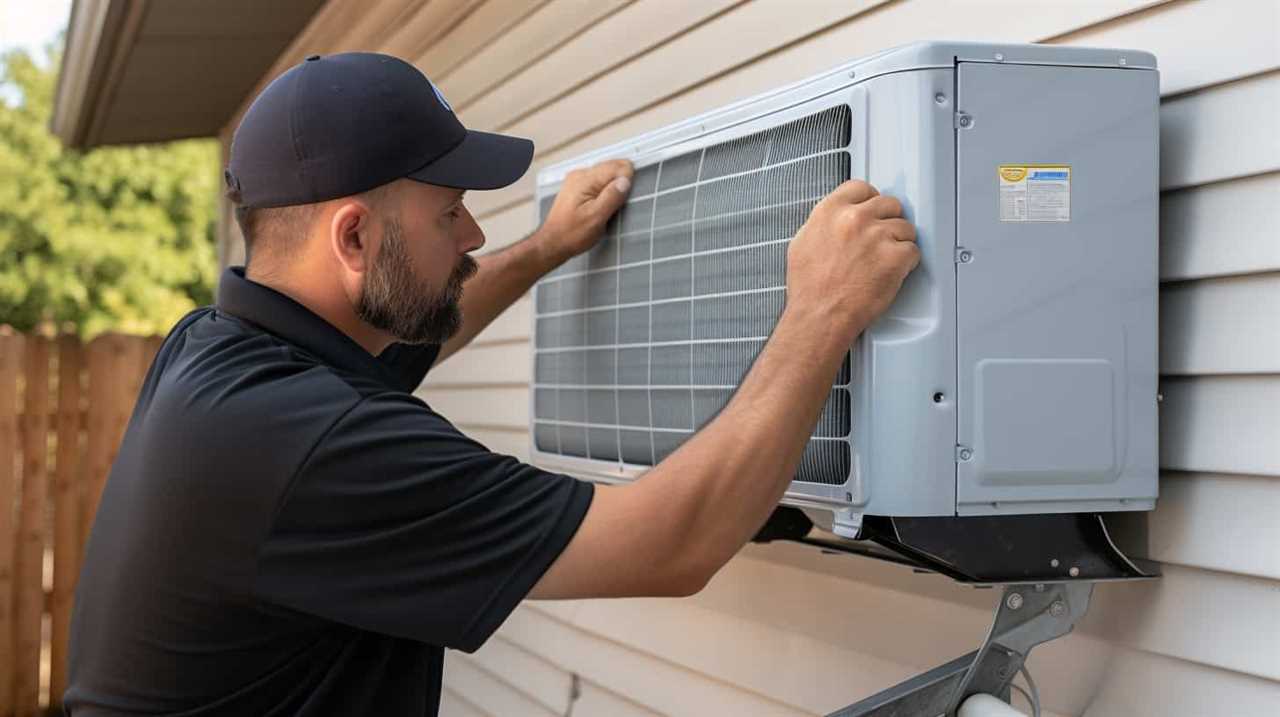
-
Energy-saving technology: Look for heat pump ACs that utilize advanced energy-saving technology. This can include features like variable speed compressors, which adjust the cooling output to match the specific needs of your home, resulting in reduced energy consumption.
-
Cost-effective cooling: Opt for a heat pump AC that offers cost-effective cooling. Look for units with high energy efficiency ratios (EER) and seasonal energy efficiency ratios (SEER), as these indicate how efficiently the unit can cool your space while minimizing energy usage and costs.
-
Smart thermostat compatibility: Consider heat pump ACs that are compatible with smart thermostats. This allows you to easily control and monitor your cooling system remotely, optimizing energy usage and comfort levels.
-
Zoning capabilities: Look for units that offer zoning capabilities, allowing you to independently control the temperature in different areas of your home. This feature ensures that you only cool the areas that need it, saving energy and reducing costs.

Tips for Maximizing Energy Efficiency With Heat Pump ACs
To maximize energy efficiency with heat pump ACs, we can follow these tips.
-
Utilize energy-saving techniques such as setting the thermostat to a moderate temperature and using the ‘energy saver’ mode. This reduces the workload on the heat pump and saves energy.
-
Ensure proper maintenance of the heat pump AC. Regularly clean or replace the air filters to improve airflow and system efficiency. Keep the outdoor unit clear of debris and vegetation to optimize heat exchange.
-
Additionally, schedule professional maintenance at least once a year to check for refrigerant leaks, inspect electrical connections, and calibrate the system.
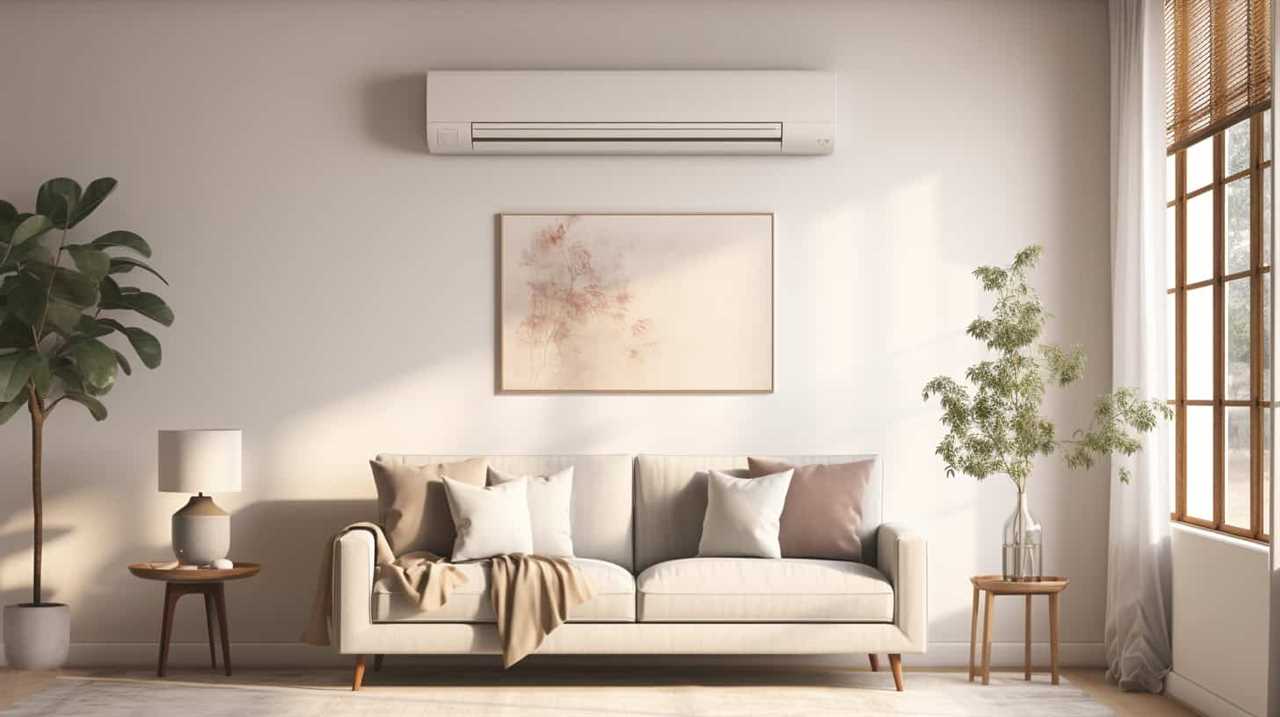
Frequently Asked Questions
How Much Money Can I Expect to Save on My Energy Bills by Using an Energy-Efficient Heat Pump Ac?
By using an energy-efficient heat pump AC instead of a traditional AC, we can expect to save a significant amount of money on our energy bills. The benefits of an energy-efficient heat pump AC include increased efficiency and reduced energy consumption.
Are There Any Tax Incentives or Rebates Available for Purchasing an Energy-Efficient Heat Pump Ac?
Yes, there are tax incentives and rebates available for purchasing an energy-efficient heat pump AC. These incentives can help offset the initial cost and encourage energy savings in the long run.
Can I Use an Energy-Efficient Heat Pump AC in Colder Climates?
Yes, you can use energy-efficient heat pump ACs in colder climates. They have the advantage of providing both cooling and heating, making them suitable for regions with varying temperatures.
How Long Does an Energy-Efficient Heat Pump AC Typically Last?
Heat pump ACs typically last for around 15-20 years. However, with proper maintenance, they can surpass this range. Regular maintenance can also help reduce the overall maintenance cost and ensure their longevity.
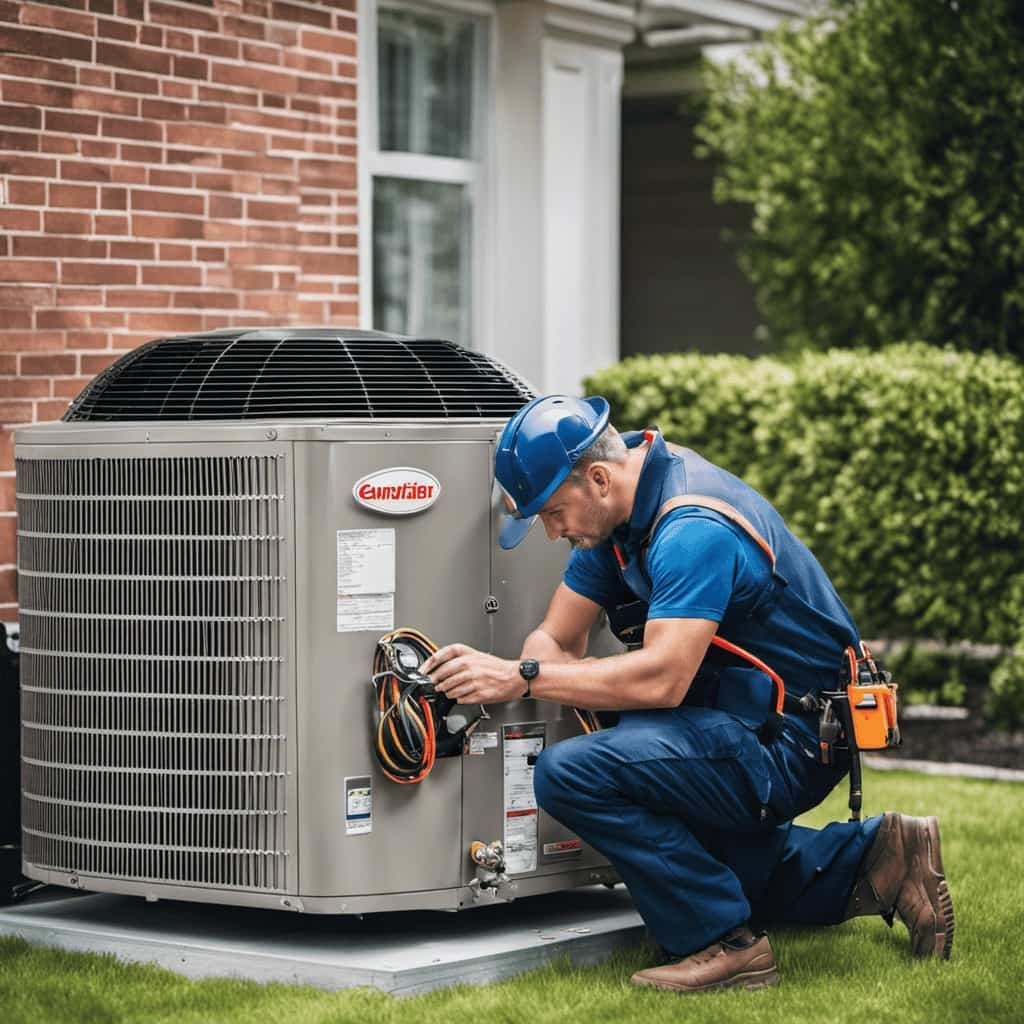
Are There Any Maintenance Requirements for Energy-Efficient Heat Pump Acs?
There are maintenance requirements for energy-efficient heat pump ACs. Regular filter cleaning, coil inspection, and refrigerant level checks are necessary to ensure optimal performance and maximize the benefits of these innovative systems.
Conclusion
In conclusion, choosing an energy-efficient heat pump AC can significantly reduce energy consumption and lower utility bills. By investing in top brands and considering important factors such as SEER ratings and size, consumers can make a smart choice.
Features like programmable thermostats and variable speed compressors further enhance the efficiency of these systems. By following tips for maximizing energy efficiency, individuals can create a comfortable and eco-friendly living space while saving money in the long run.
Air Conditioning
Your Guide: Installing a Heat Pump for AC

Are you looking for a way to beat the heat this summer and save on your energy costs? Interested in learning about installing a heat pump for air conditioning? Look no further, as we have the ultimate guide for you here.
Are you ready to revolutionize your cooling system? With our step-by-step process and expert tips, you’ll be well on your way to a more efficient and comfortable home.
Let’s dive in and discover the ins and outs of heat pump installation!
Key Takeaways
- Heat pumps transfer heat from one location to another and can provide both heating and cooling.
- Assessing the home’s cooling needs involves considering factors such as size, insulation, and climate, as well as evaluating the efficiency and maintenance requirements of heat pumps.
- Choosing the right heat pump size is important to ensure energy efficiency and minimize maintenance issues.
- Preparing the home for heat pump installation involves gathering necessary tools and materials, addressing insulation requirements, meeting electrical requirements, and preparing the outdoor area for installation.
Understanding Heat Pumps: A Brief Overview
Let’s start by understanding how heat pumps work and their key components. Heat pumps are innovative systems that use a small amount of energy to transfer heat from one location to another. They work by extracting heat from the air or ground outside your home and transferring it indoors during the colder months. In the summer, the process is reversed, and heat is extracted from the indoor air and released outside, providing cooling. This efficient mechanism allows heat pumps to provide both heating and cooling, making them versatile and cost-effective.

The benefits of heat pumps include energy efficiency, lower utility bills, and reduced environmental impact. Now that we’ve a basic understanding of heat pump mechanics and their advantages, let’s move on to assessing your home’s cooling needs.
Assessing Your Home’s Cooling Needs
To accurately determine our home’s cooling needs, we need to consider factors such as the size of our space, insulation levels, and the climate we live in.
Evaluating the efficiency of a heat pump is crucial in determining its ability to effectively cool our home. Heat pumps with higher Seasonal Energy Efficiency Ratios (SEER) are more efficient and can provide greater energy savings.
Additionally, we should also assess the maintenance requirements of the heat pump. Some models may require regular filter changes or annual professional maintenance to ensure optimal performance.
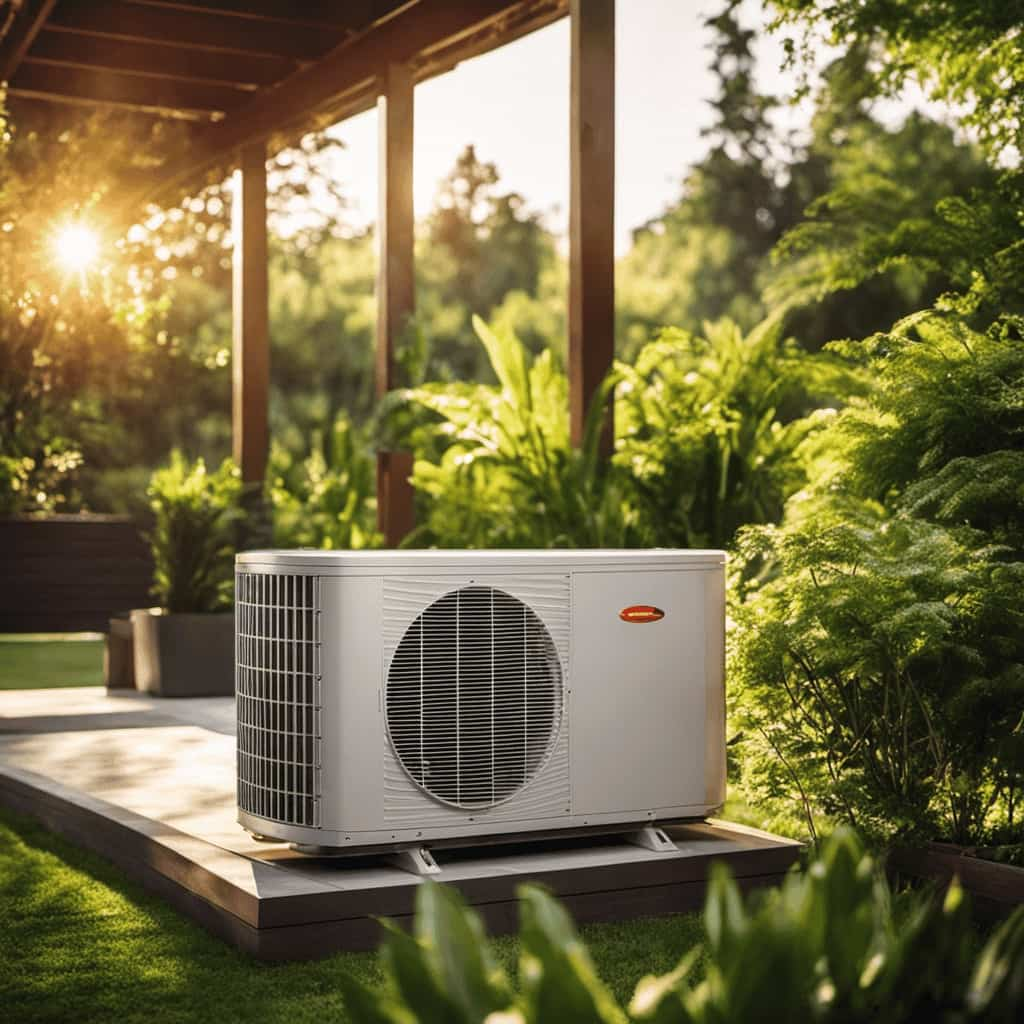
By evaluating these factors, we can choose a heat pump that meets our cooling needs while maximizing efficiency and minimizing maintenance requirements.
This will ensure a comfortable and cost-effective cooling solution for our home.
Choosing the Right Heat Pump Size
Determining the appropriate heat pump size involves calculating the square footage of our home and considering factors such as insulation, climate, and desired temperature. To ensure optimal heat pump efficiency, it’s crucial to choose a size that matches our specific cooling needs.
Oversized units can lead to frequent on-off cycling, causing unnecessary wear and tear on the system and reducing its lifespan. On the other hand, undersized units may struggle to cool the space efficiently, resulting in inadequate comfort and increased energy consumption.

To find the right size, we can consult a professional HVAC technician who can perform a load calculation based on our home’s unique characteristics. This calculation takes into account factors like insulation levels, window efficiency, and local climate conditions. By selecting the correct heat pump size, we can maximize energy efficiency and minimize the need for future maintenance.
With the appropriate size determined, we can now move on to the next step of preparing our home for heat pump installation.
Preparing Your Home for Heat Pump Installation
We will need to gather all the necessary tools and materials before starting the heat pump installation process.
To ensure optimal performance and energy efficiency, it’s important to address insulation requirements in your home. Proper insulation will help prevent air leakage and maintain a comfortable indoor temperature. Inspect your attic, walls, and windows for any gaps or areas that may need additional insulation.
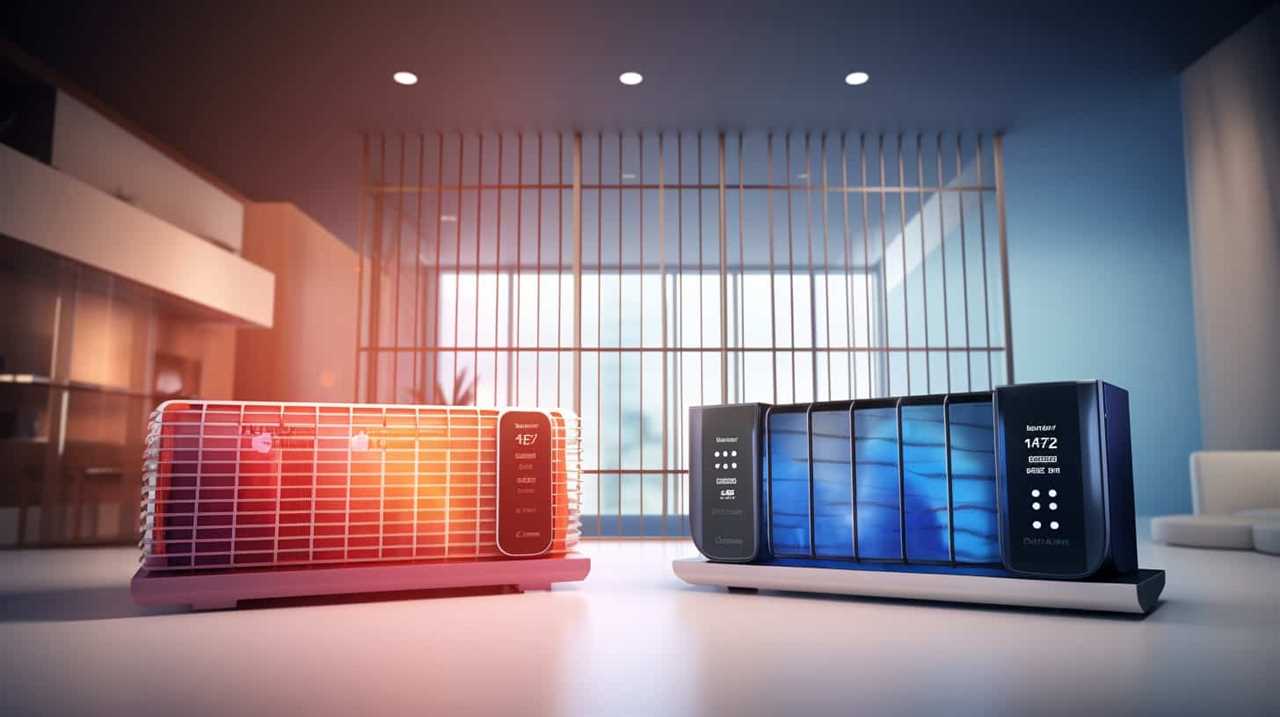
Additionally, it’s crucial to meet the electrical requirements for your heat pump installation. Consult with a licensed electrician to determine if your current electrical system can handle the load of the heat pump. If necessary, electrical upgrades may be needed to ensure safe and reliable operation.
Taking these steps will help prepare your home for a successful heat pump installation.
Step-by-Step Heat Pump Installation Process
First, we’ll begin by removing the old HVAC system and preparing the location for the new heat pump installation. This involves disconnecting the existing system, removing any ductwork, and ensuring the area is clean and ready for the new heat pump.
Once the area is prepared, we’ll begin the installation process. This includes mounting the heat pump unit outside, connecting the refrigerant lines, and installing the indoor unit. We’ll also need to connect the electrical wiring and thermostat.
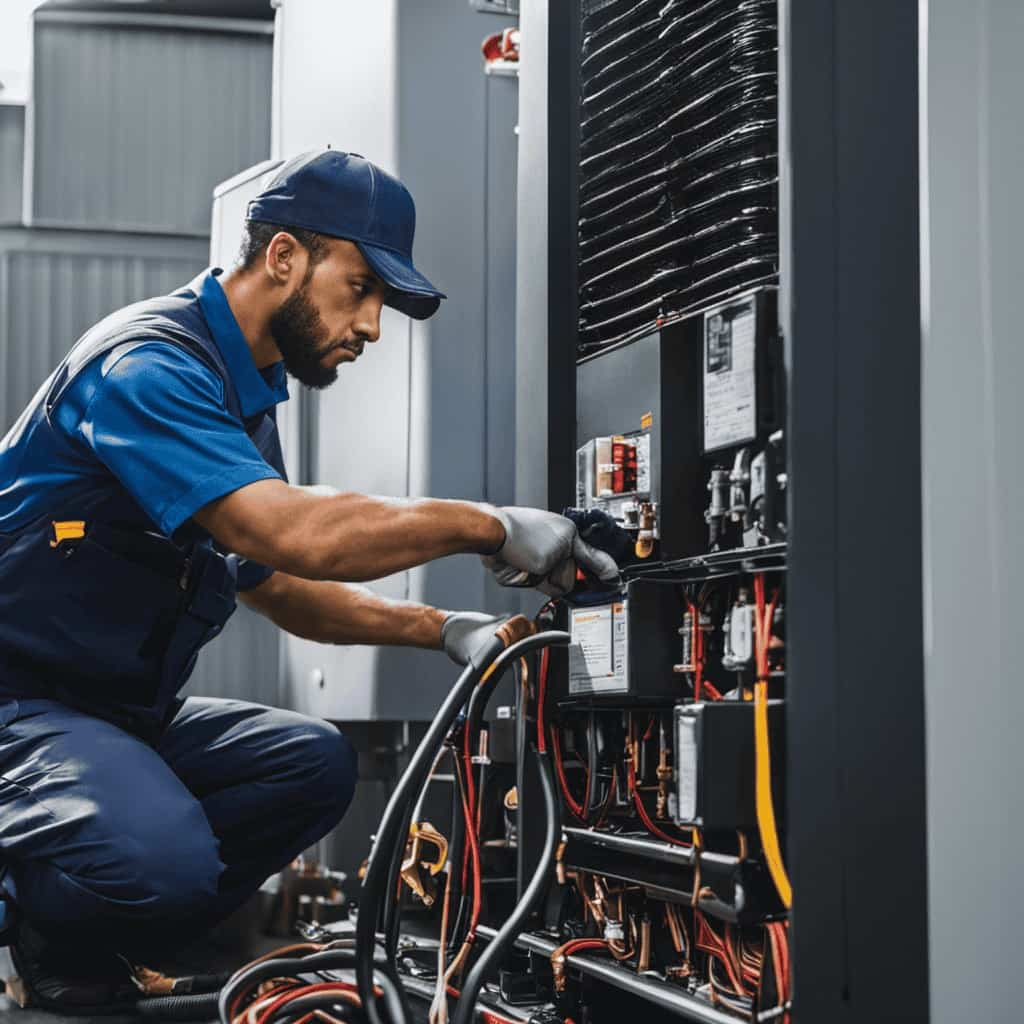
After the physical installation is complete, we’ll test the system to ensure it’s functioning properly. It’s important to note that regular heat pump maintenance is crucial for optimal performance. This includes cleaning or replacing filters, checking refrigerant levels, and troubleshooting any heat pump issues that may arise.
Frequently Asked Questions
What Is the Average Lifespan of a Heat Pump?
The average lifespan of a heat pump depends on various factors, such as maintenance requirements. It is important to regularly maintain your heat pump to ensure optimal performance and prolong its lifespan.
Are Heat Pumps Suitable for All Types of Homes?
Heat pumps are suitable for most homes due to their efficiency and cost savings. They can be installed in various types of homes, providing both heating and cooling capabilities.
How Often Should a Heat Pump Be Serviced?
Heat pump maintenance is crucial for optimal performance. Regular servicing ensures efficiency, prolongs lifespan, and minimizes breakdowns. Benefits include improved energy savings, enhanced comfort, and reduced environmental impact. Schedule annual maintenance to maximize the benefits.
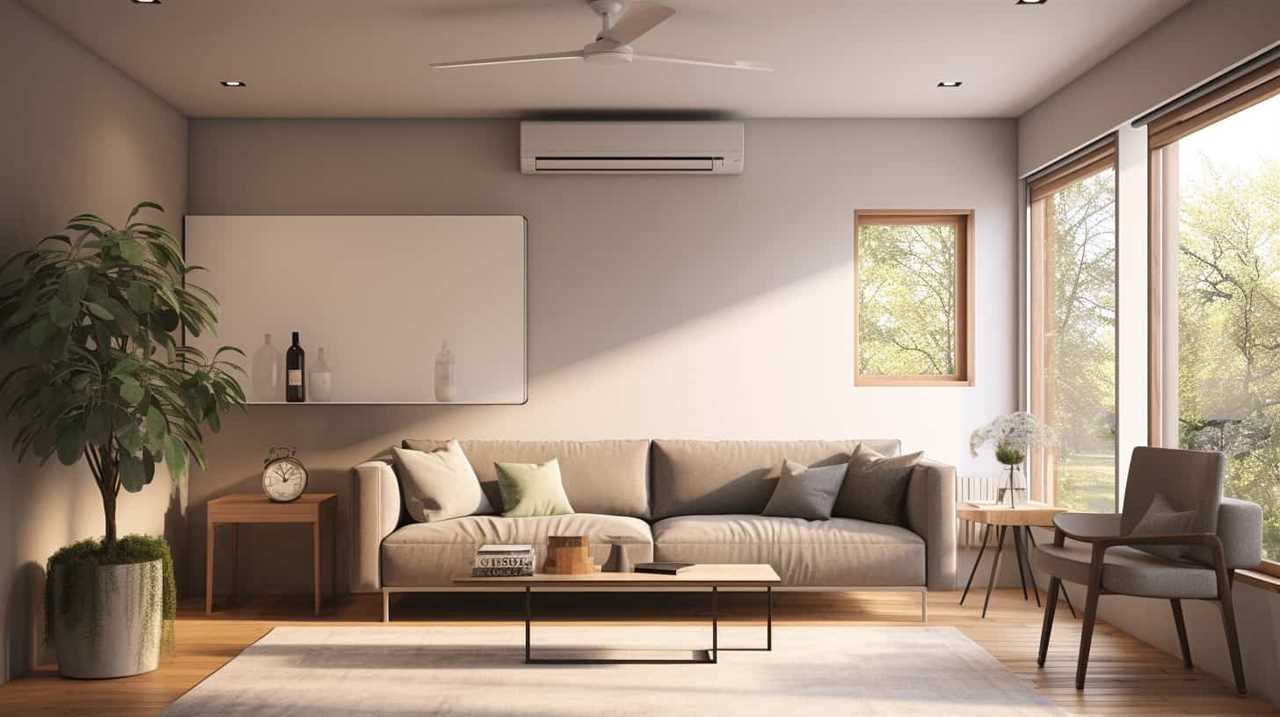
Can a Heat Pump Be Used as the Primary Heating Source in Colder Climates?
Yes, a heat pump can be used as the primary heating source in colder climates. It utilizes innovative technology to extract heat from the outside air and efficiently distribute it indoors, providing reliable and cost-effective warmth.
Are There Any Government Incentives or Rebates Available for Installing a Heat Pump?
There are government incentives available for installing a heat pump, providing significant energy savings and financial benefits. These incentives aim to promote innovation and encourage individuals to adopt more sustainable heating and cooling solutions.
Conclusion
So there you have it, folks. Installing a heat pump for AC is as easy as juggling flaming chainsaws while riding a unicycle on a tightrope. Just kidding!
But seriously, with the right knowledge and preparation, you can successfully install a heat pump and enjoy efficient cooling in your home. Remember to assess your cooling needs, choose the right size, and follow the step-by-step installation process.
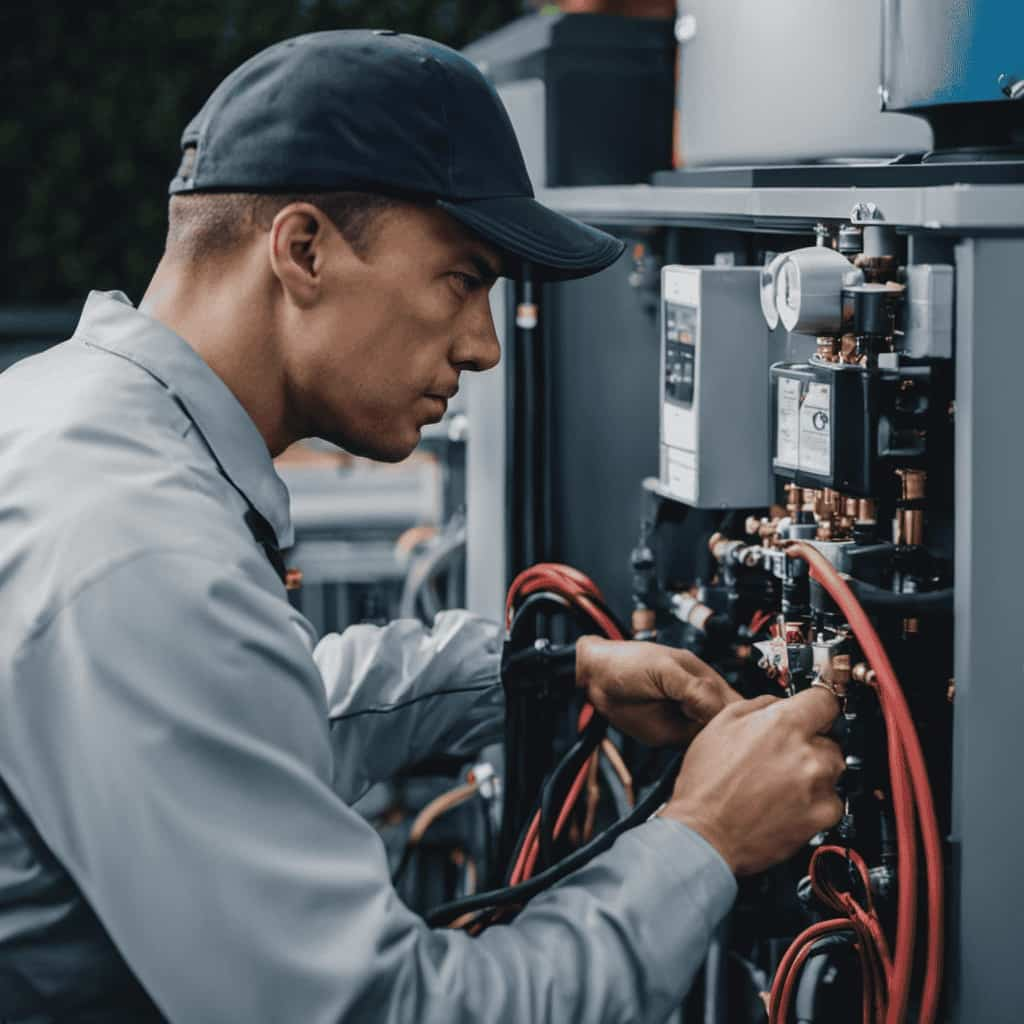
It’s like a thrilling rollercoaster ride, except without the screams and the fear of plummeting to your doom.
Happy cooling!
-

 Residential and Commercial Applications3 months ago
Residential and Commercial Applications3 months agoBest Amana Heat Pump Reviews
-

 Thermal Energy Transfer3 months ago
Thermal Energy Transfer3 months agoBreakthroughs in Modern Heat Pump Systems: Thermal Energy Edition
-

 Residential and Commercial Applications3 months ago
Residential and Commercial Applications3 months agoBest Heat Pump
-

 Geothermal Heat Pumps2 months ago
Geothermal Heat Pumps2 months agoUpgrade Your Comfort with Our Efficient HVAC Systems
-

 Geothermal Heat Pumps2 months ago
Geothermal Heat Pumps2 months agoInnovative Geothermal Heat Pump Manufacturers Revolutionize Energy Efficiency
-

 Air Conditioning4 weeks ago
Air Conditioning4 weeks agoExploring Energy-Efficient Air Conditioning Heat Pumps
-

 Thermal Energy Transfer3 months ago
Thermal Energy Transfer3 months agoBoost Your Heat Pump Efficiency: Interactive Guide
-

 Residential and Commercial Applications3 months ago
Residential and Commercial Applications3 months agoBest Portable Heat Pump Heat & AC











